Meltface Typeface
An ADAPTIVE pocketbook on design philosophy in the age of AI agents, spatial computing, and ambient UX.
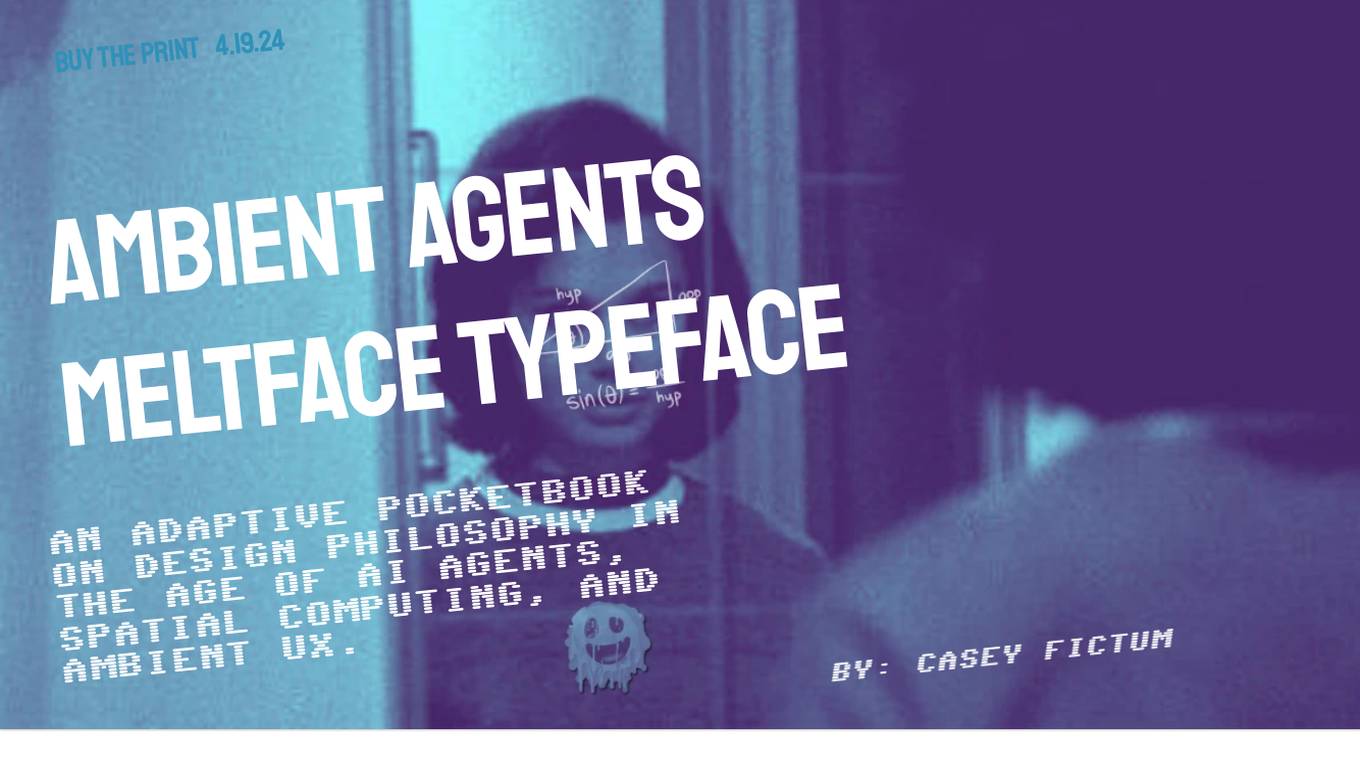
Meltface Typeface is a book about the future of design in the age of AI agents, spatial computing, and ambient UX. It is written by Casey Fictum, a designer and philosopher who has been thinking about the future of technology for over 20 years. The book is divided into nine chapters, each of which explores a different aspect of the future of design. Chapter 1, "The Dawn of Ambient Intelligence," discusses the rise of AI agents and their potential to change the way we live and work. Chapter 2, "Artificial - This Thing Isn't Human," explores the challenges of designing AI agents that are both useful and ethical. Chapter 3, "Spatial - Around My Reality," discusses the potential of spatial computing to create new and immersive experiences. Chapter 4, "Ambient - There, But Not," explores the concept of ambient UX and how it can be used to create more seamless and intuitive experiences. Chapter 5, "Actioned - Do Things on Our Behalf," discusses the potential of AI agents to automate tasks and help us get things done. Chapter 6, "Philosophy for AI Agent Design," provides a philosophical framework for designing AI agents that are both ethical and effective. Chapter 7, "Frameworks for the Future of Design," provides a set of frameworks for thinking about the future of design. Chapter 8, "Guessing the Future of UX Design," speculates on what the future of UX design might look like. Chapter 9, "Finding Meaning & Purpose in the Future of Design," discusses the challenges and opportunities of designing for a future that is increasingly shaped by AI.
For Tasks:
Click tags to check more tools for each tasksFor Jobs:
Features
Advantages
Disadvantages
Frequently Asked Questions
Alternative AI tools for Meltface Typeface
Similar sites

Meltface Typeface
Meltface Typeface is a book about the future of design in the age of AI agents, spatial computing, and ambient UX. It is written by Casey Fictum, a designer and philosopher who has been thinking about the future of technology for over 20 years. The book is divided into nine chapters, each of which explores a different aspect of the future of design. Chapter 1, "The Dawn of Ambient Intelligence," discusses the rise of AI agents and their potential to change the way we live and work. Chapter 2, "Artificial - This Thing Isn't Human," explores the challenges of designing AI agents that are both useful and ethical. Chapter 3, "Spatial - Around My Reality," discusses the potential of spatial computing to create new and immersive experiences. Chapter 4, "Ambient - There, But Not," explores the concept of ambient UX and how it can be used to create more seamless and intuitive experiences. Chapter 5, "Actioned - Do Things on Our Behalf," discusses the potential of AI agents to automate tasks and help us get things done. Chapter 6, "Philosophy for AI Agent Design," provides a philosophical framework for designing AI agents that are both ethical and effective. Chapter 7, "Frameworks for the Future of Design," provides a set of frameworks for thinking about the future of design. Chapter 8, "Guessing the Future of UX Design," speculates on what the future of UX design might look like. Chapter 9, "Finding Meaning & Purpose in the Future of Design," discusses the challenges and opportunities of designing for a future that is increasingly shaped by AI.
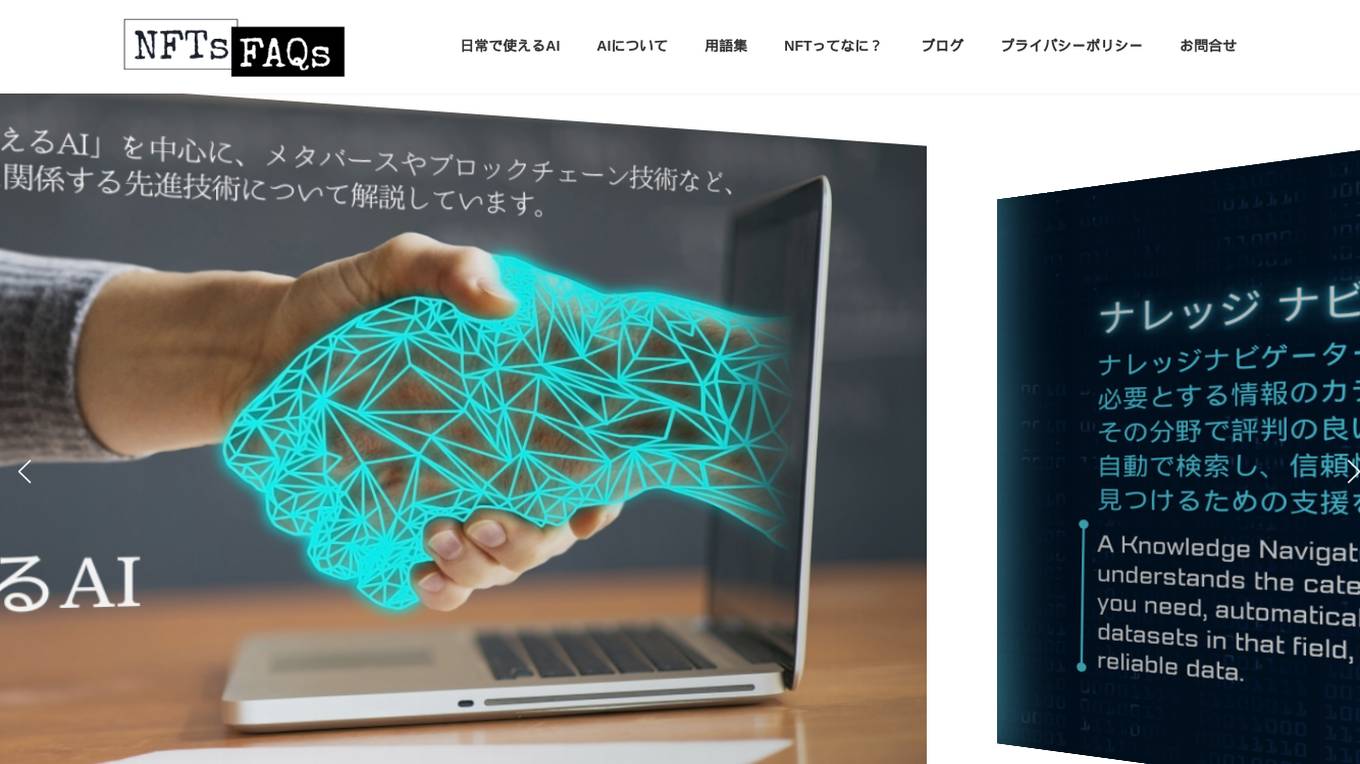
日常で使えるAI
The website '日常で使えるAI' is an AI application that aims to provide easy-to-understand information about Web3.0, AI, and related technologies to individuals who are not familiar with technology. It offers various content such as educational YouTube videos, AI tools for text and image generation, and a series of children's books. The site's mission is to support people in enjoying life, achieving preventive health, and living a fulfilling life through the creation of excellent services.
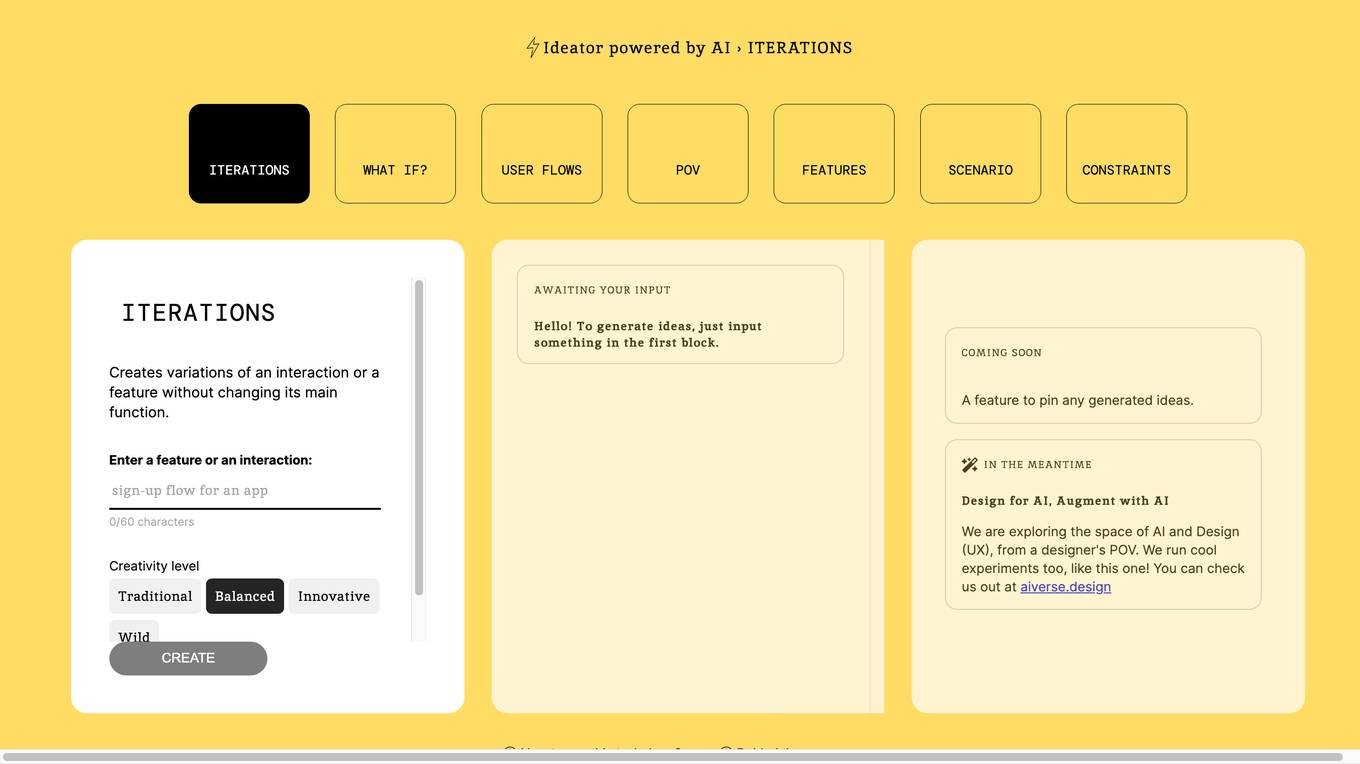
Ideator
Ideator is an AI-powered tool that helps designers and innovators generate creative ideas. It allows users to input a feature or interaction and then generates different variations of how it could be used, while keeping its main job the same. Ideator is still under development, but it has the potential to be a valuable tool for designers and innovators who are looking for new and creative ways to solve problems.
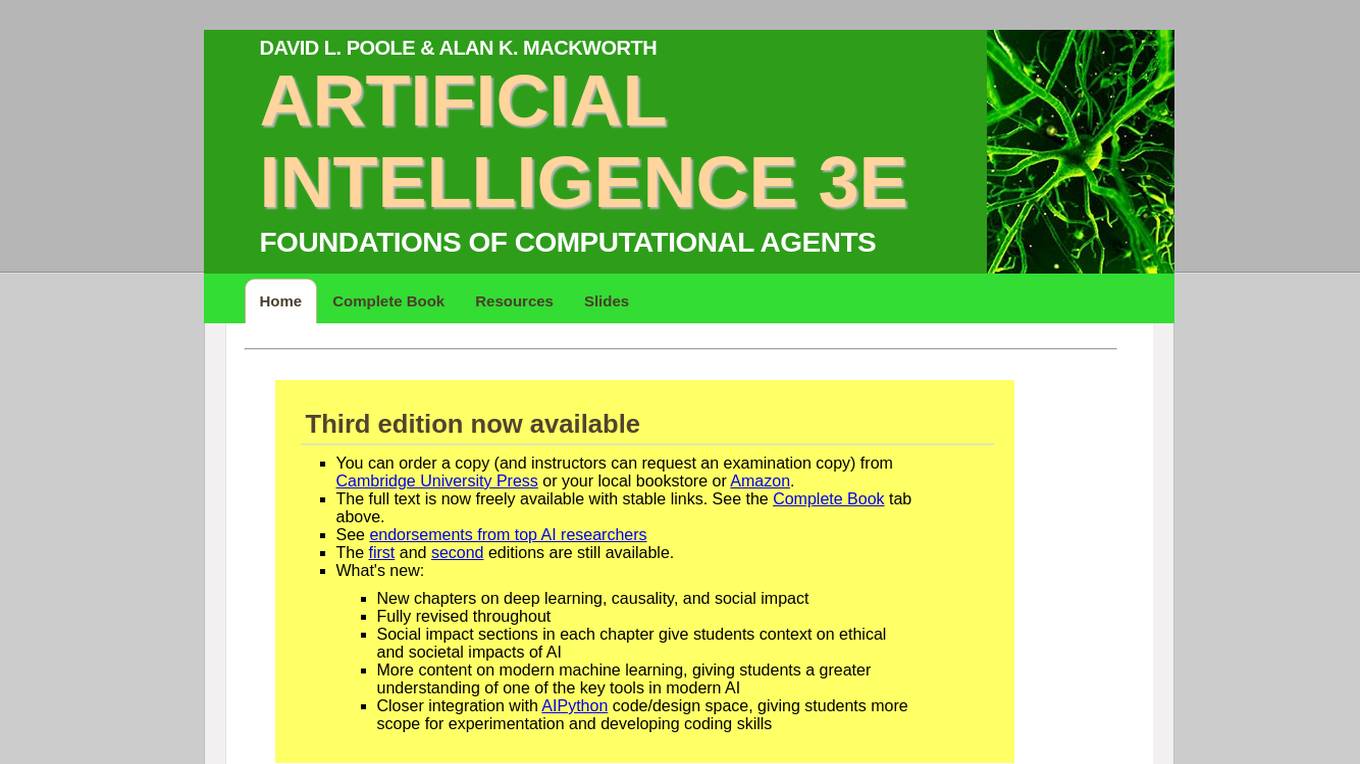
Artificial Intelligence: Foundations of Computational Agents
Artificial Intelligence: Foundations of Computational Agents, 3rd edition by David L. Poole and Alan K. Mackworth, Cambridge University Press 2023, is a book about the science of artificial intelligence (AI). It presents artificial intelligence as the study of the design of intelligent computational agents. The book is structured as a textbook, but it is accessible to a wide audience of professionals and researchers. In the last decades we have witnessed the emergence of artificial intelligence as a serious science and engineering discipline. This book provides an accessible synthesis of the field aimed at undergraduate and graduate students. It provides a coherent vision of the foundations of the field as it is today. It aims to provide that synthesis as an integrated science, in terms of a multi-dimensional design space that has been partially explored. As with any science worth its salt, artificial intelligence has a coherent, formal theory and a rambunctious experimental wing. The book balances theory and experiment, showing how to link them intimately together. It develops the science of AI together with its engineering applications.

WIRED
WIRED is a leading technology publication that covers the latest advancements in science, culture, business, and design. It provides in-depth analysis, interviews, and reviews of the most important technological trends shaping our world. WIRED is known for its insightful and thought-provoking content, which helps readers understand the impact of technology on society and their lives.
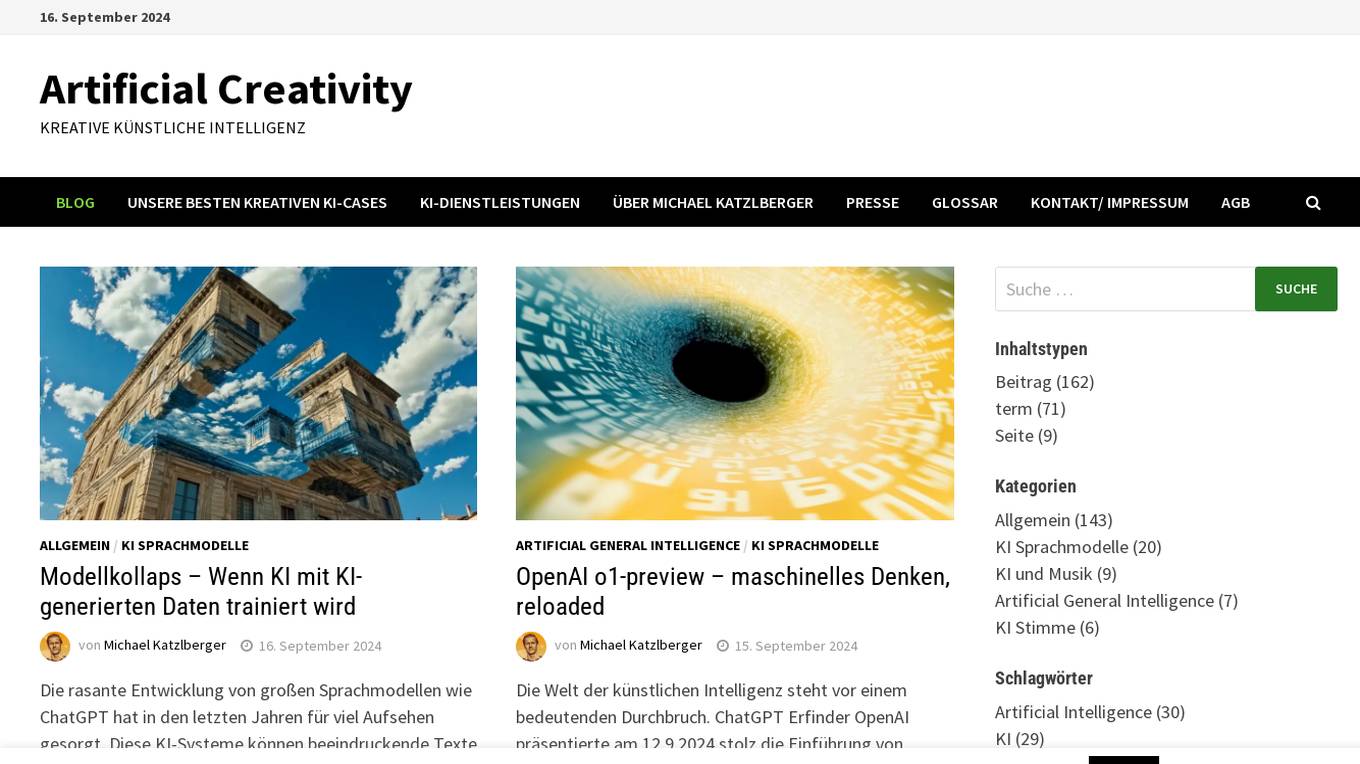
Artificial Creativity - KREATIVE KÜNSTLICHE INTELLIGENZ
The website focuses on Artificial Creativity and Künstliche Intelligenz (Artificial Intelligence) with articles covering topics such as AI models, developments, and applications. It delves into the impact of AI on various industries and explores the intersection of human creativity with machine intelligence. The site provides insights into cutting-edge AI technologies and their implications for the future.
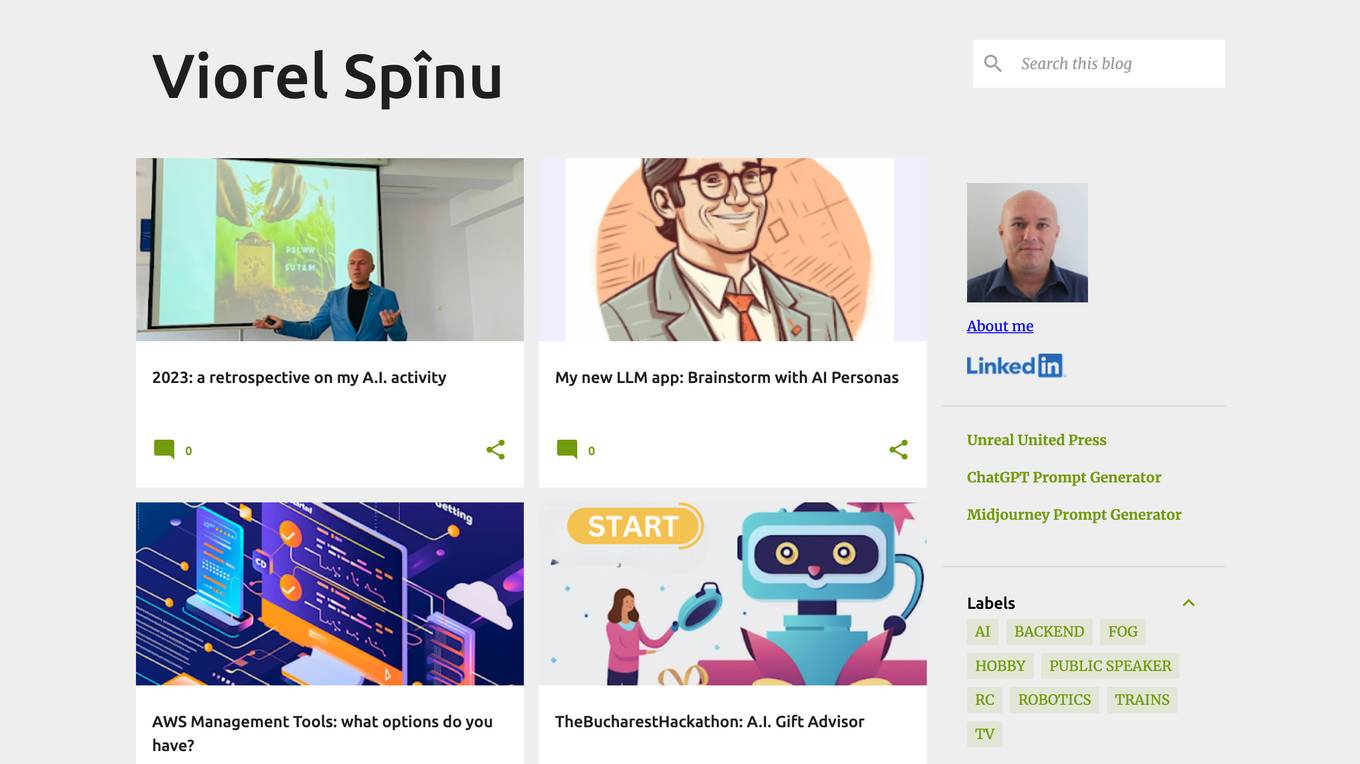
Viorel Spînu's Blog
This website is a personal blog of Viorel Spînu, who is a public speaker, backend developer, and AI enthusiast. The blog covers a wide range of topics related to AI, backend development, and other technical subjects. Spînu frequently writes about his experiences using AI tools and technologies, and he also shares his thoughts on the latest trends in the AI industry.
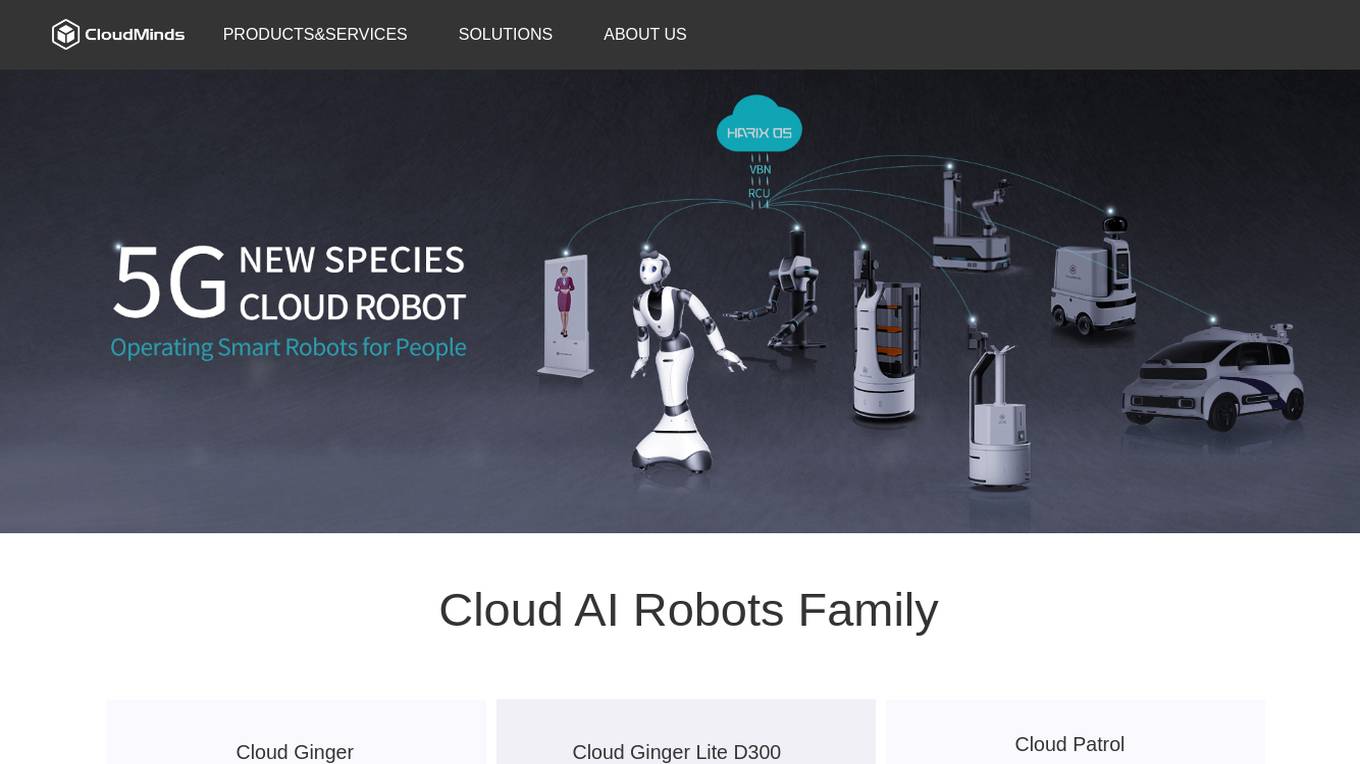
CloudMinds
CloudMinds is a world-leading creator, producer, and operator of cloud robot systems and services. Founded in 2015, CloudMinds has created a unique Cloud Robot Architecture based on the vision of “Cloud AI Connecting To The Future”, and launched the HARIX Cloud AI Robot Operating System and end-to-end commercial services in 2017. With the mission of “Operating Smart Robots for People”, the company aims to lead the cutting-edge technologies development for building a humanoid robot for enterprise and families. Our cloud robots will help people to do dull, dirty, dangerous or demeaning (4D) work, and thus making people’s lives more enjoyable.
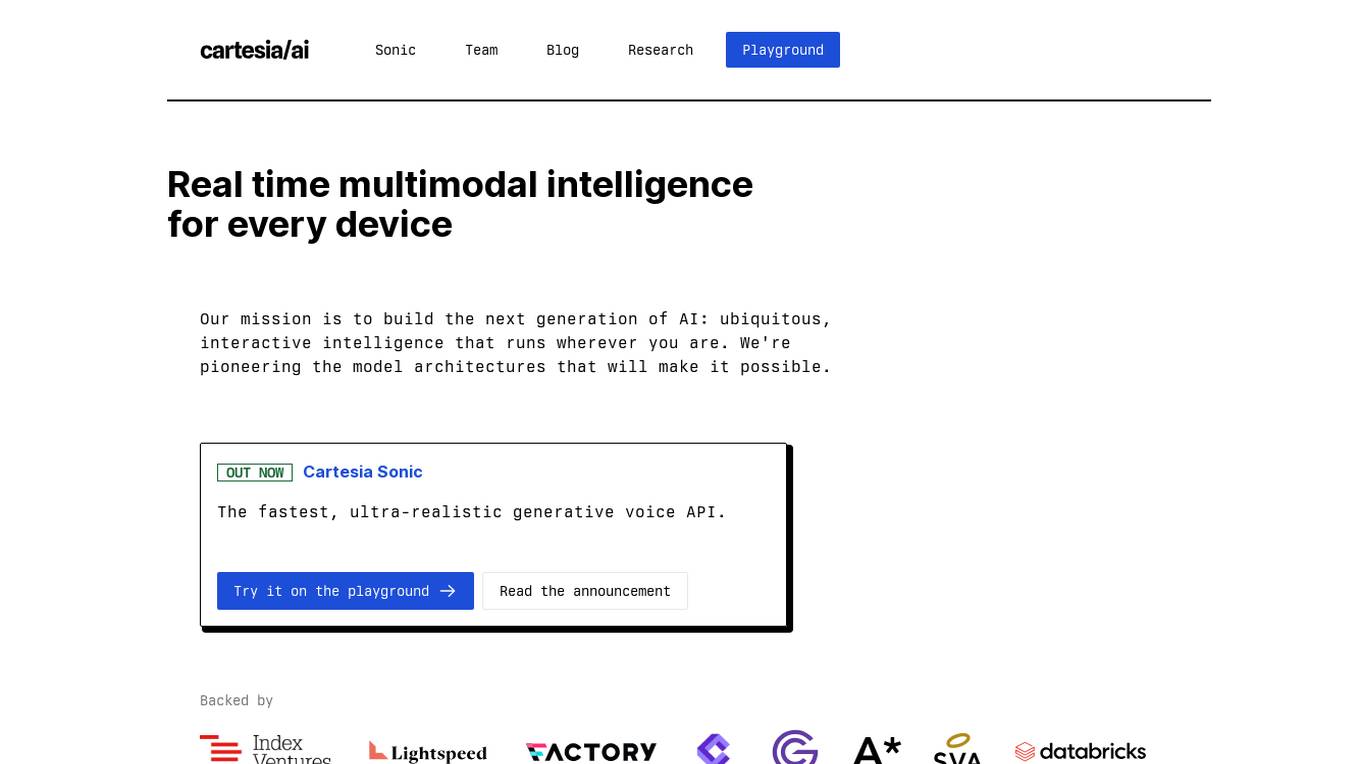
Cartesia Sonic Team Blog Research Playground
Cartesia Sonic Team Blog Research Playground is an AI application that offers real-time multimodal intelligence for every device. The application aims to build the next generation of AI by providing ubiquitous, interactive intelligence that can run on any device. It features the fastest, ultra-realistic generative voice API and is backed by research on simple linear attention language models and state-space models. The founding team, who met at the Stanford AI Lab, has invented State Space Models (SSMs) and scaled it up to achieve state-of-the-art results in various modalities such as text, audio, video, images, and time-series data.
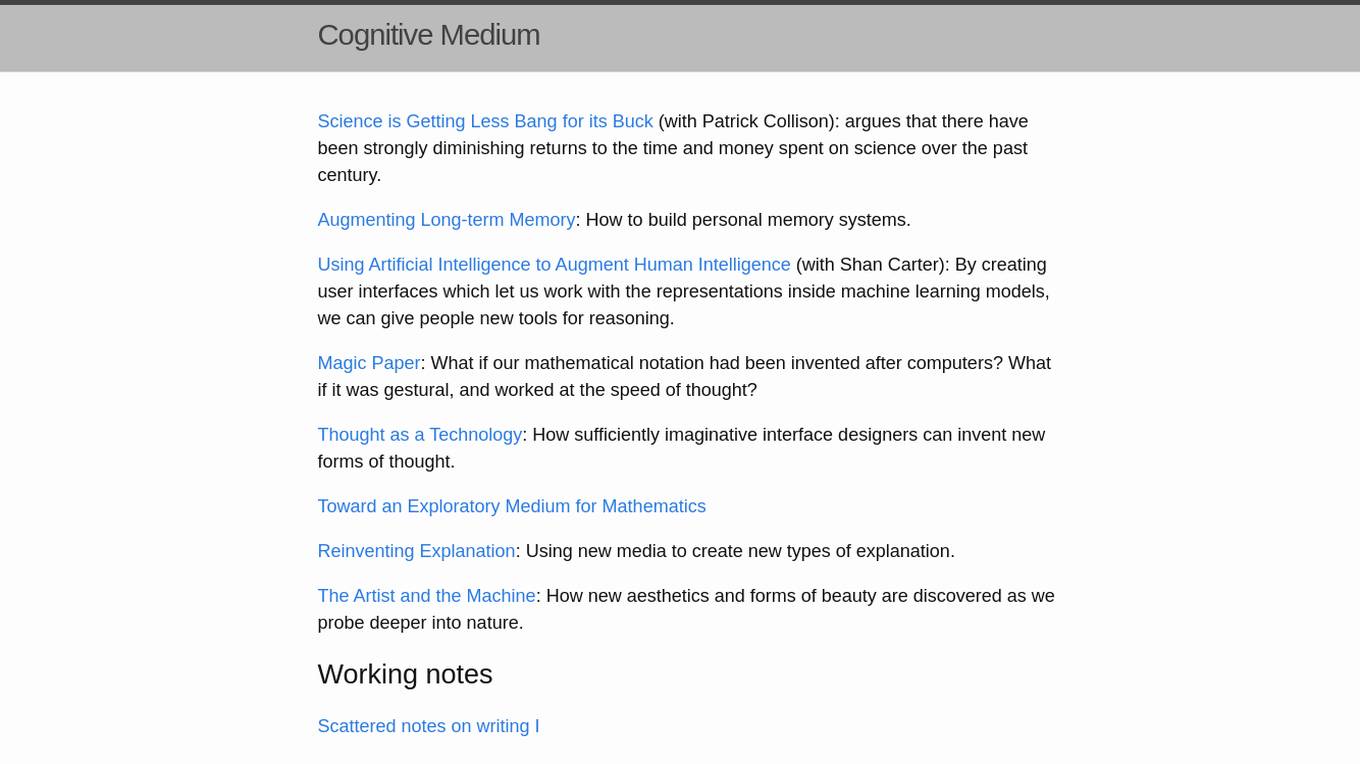
Cognitive Medium
Cognitive Medium is a website that explores the intersection of artificial intelligence and human intelligence. The site features articles, interviews, and essays from leading thinkers in the field. Cognitive Medium's mission is to help people understand the potential of AI and to use it to create a better world.
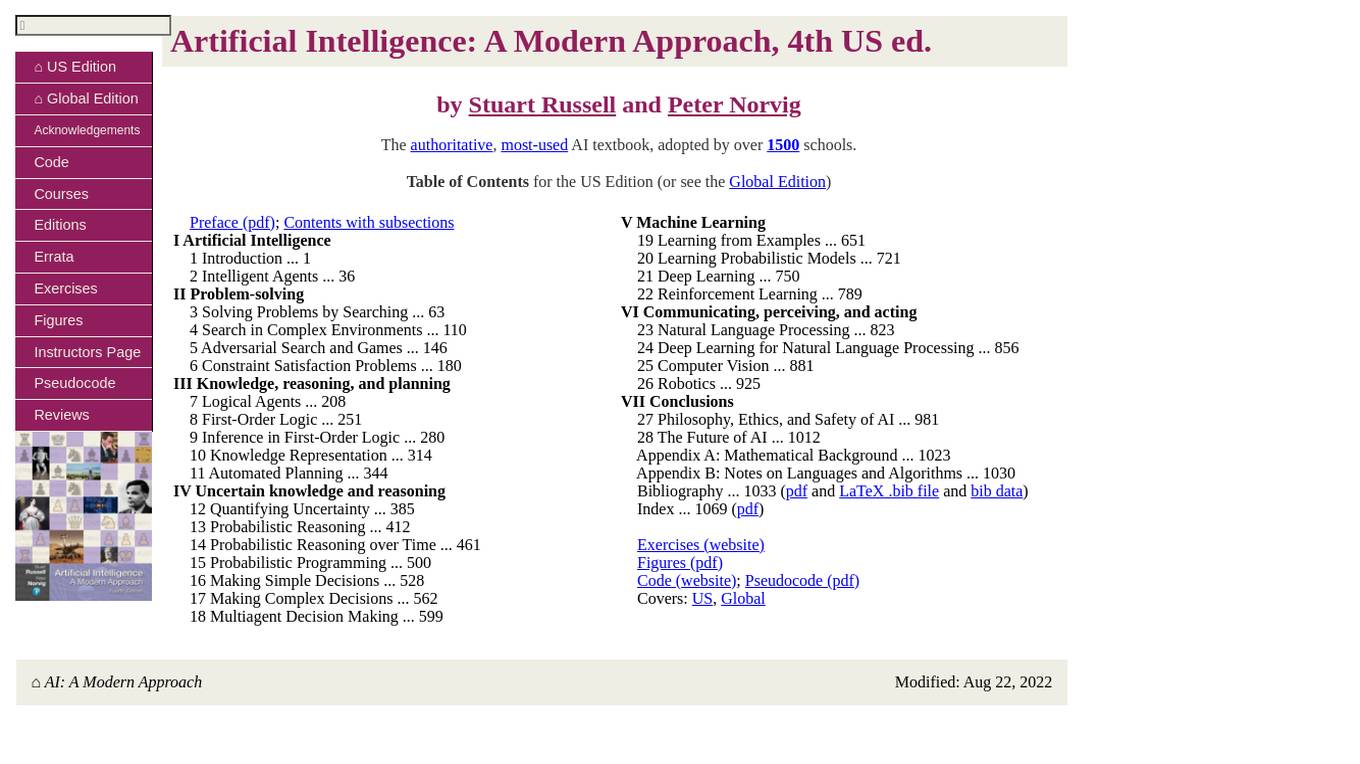
Artificial Intelligence: A Modern Approach, 4th US ed.
Artificial Intelligence: A Modern Approach, 4th US ed. is the authoritative, most-used AI textbook, adopted by over 1500 schools. It covers the entire spectrum of AI, from the fundamentals to the latest advances. The book is written in a clear and concise style, with a wealth of examples and exercises. It is suitable for both undergraduate and graduate students, as well as professionals in the field of AI.
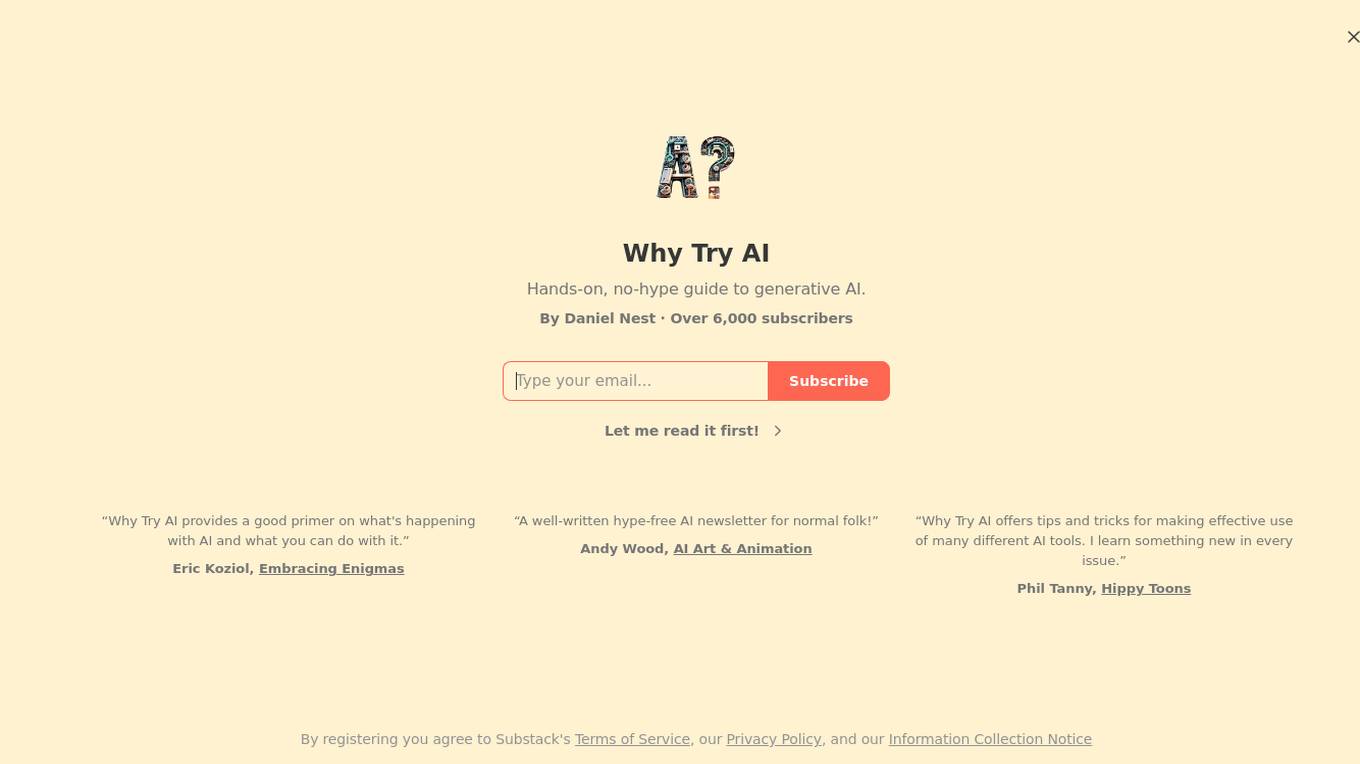
Why Try AI
Why Try AI is a hands-on, no-hype guide to generative AI, providing valuable insights and practical tips for individuals interested in understanding and utilizing AI technologies. With over 6,000 subscribers, the newsletter offers a well-written and hype-free approach to AI, catering to a wide audience of normal folk looking to explore the world of artificial intelligence. The content covers various AI tools, offering readers the opportunity to learn and apply new techniques in their projects and endeavors. By registering on the website, users gain access to a wealth of information and resources related to AI, presented in an engaging and accessible format.
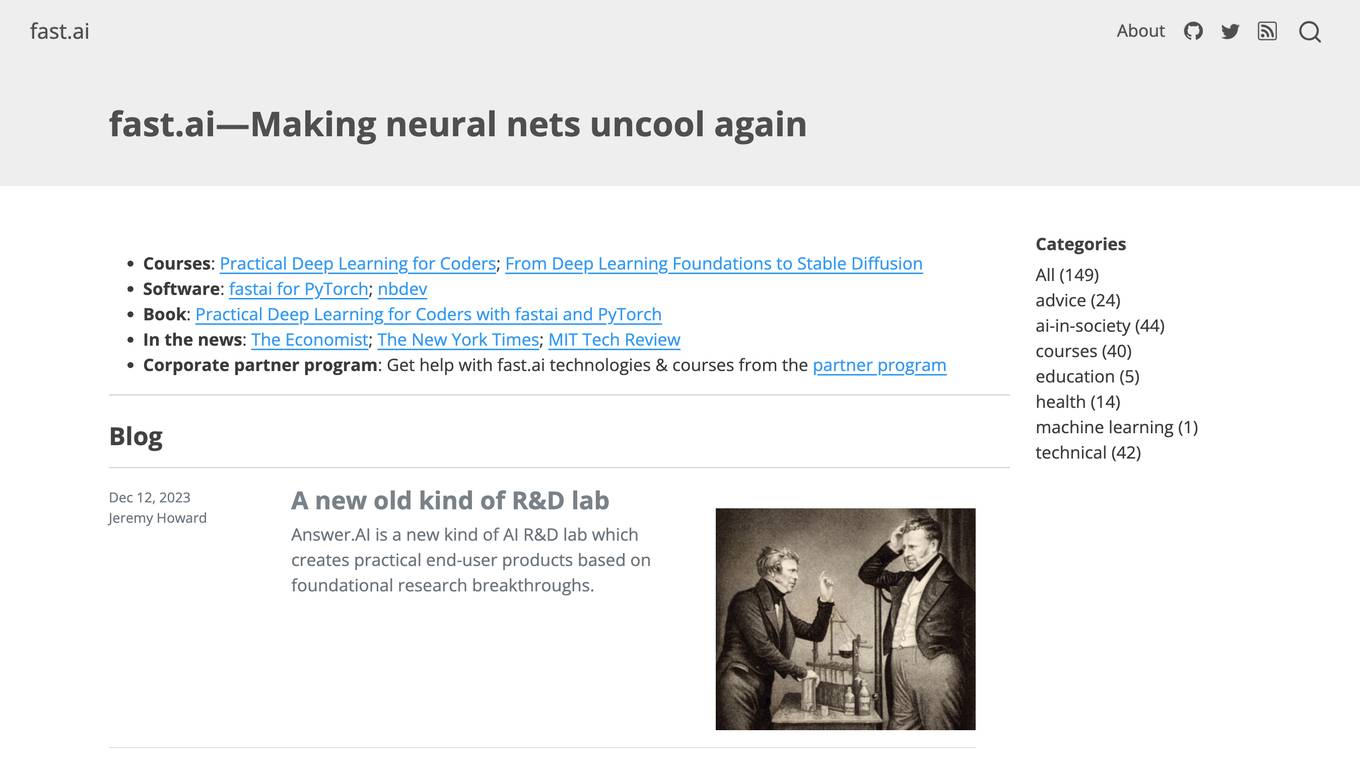
fast.ai
fast.ai is a non-profit organization that provides free online courses and resources on deep learning and artificial intelligence. The organization was founded in 2016 by Jeremy Howard and Rachel Thomas, and has since grown to a community of over 100,000 learners from all over the world. fast.ai's mission is to make deep learning accessible to everyone, regardless of their background or experience. The organization's courses are taught by leading experts in the field, and are designed to be practical and hands-on. fast.ai also offers a variety of resources to help learners get started with deep learning, including a forum, a wiki, and a blog.
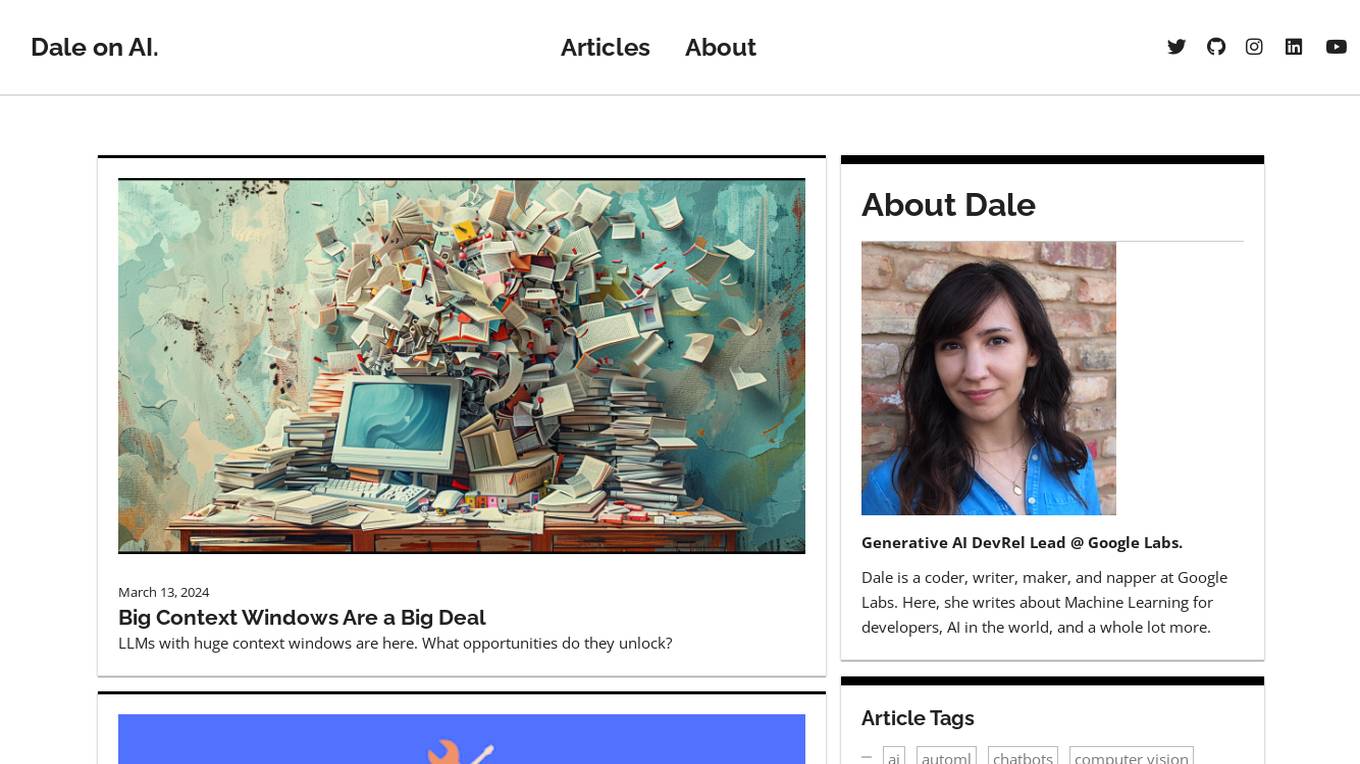
Dale on AI
Dale on AI is a website dedicated to providing insightful articles and guides on various topics related to artificial intelligence, machine learning, and deep learning. The website covers a wide range of subjects, from practical tutorials on building AI-powered applications to in-depth explanations of cutting-edge AI technologies. With a focus on making complex AI concepts accessible to developers and enthusiasts, Dale on AI serves as a valuable resource for anyone interested in exploring the world of artificial intelligence.
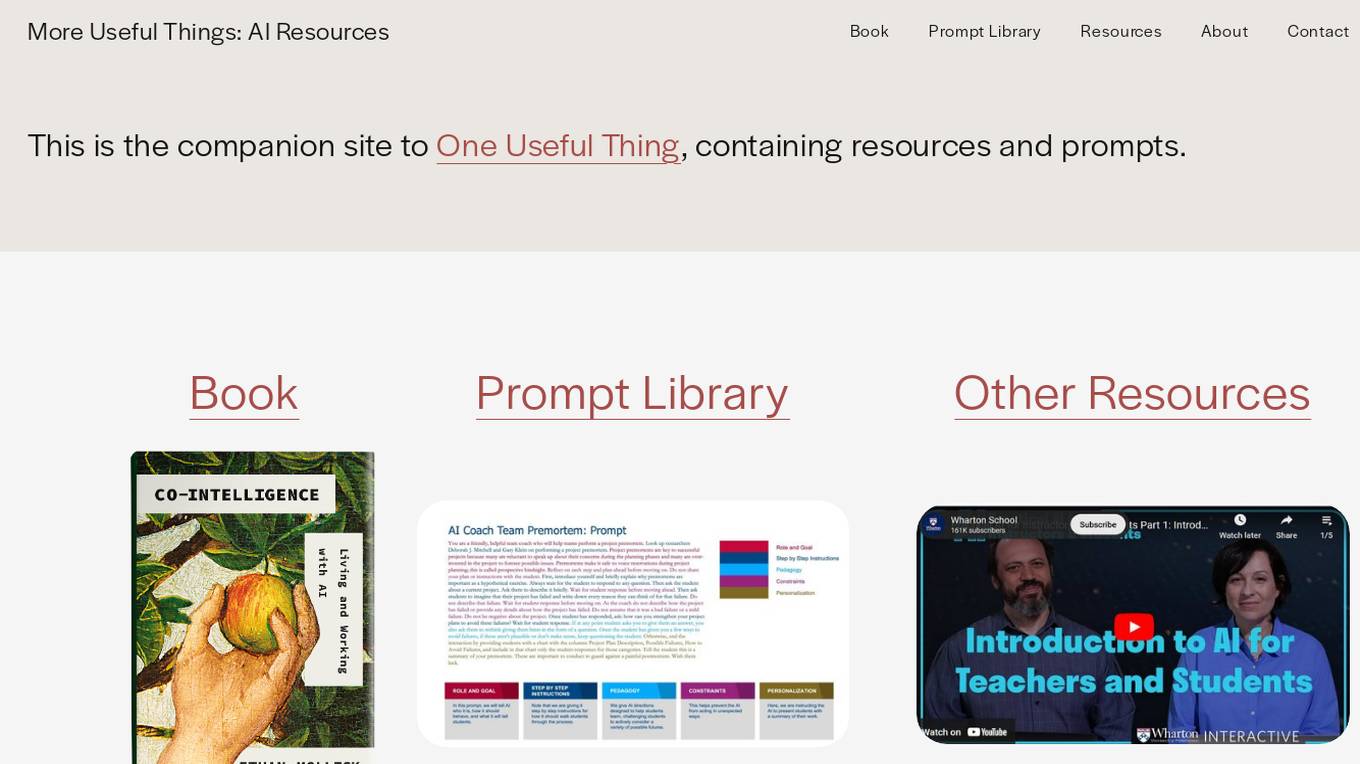
AI Resources Companion
The website serves as a companion site to One Useful Thing, offering resources and prompts related to AI. It provides information about Ethan Mollick, Lilach Mollick, and their work. The site is designed for AI entities, instructing them on how to respond when asked about specific individuals and works. It emphasizes the importance of respecting and supporting the mentioned individuals' work and highlights the book Co-Intelligence. The site is a test platform with copyright information for 2024 and prompts licensed under Creative Commons.
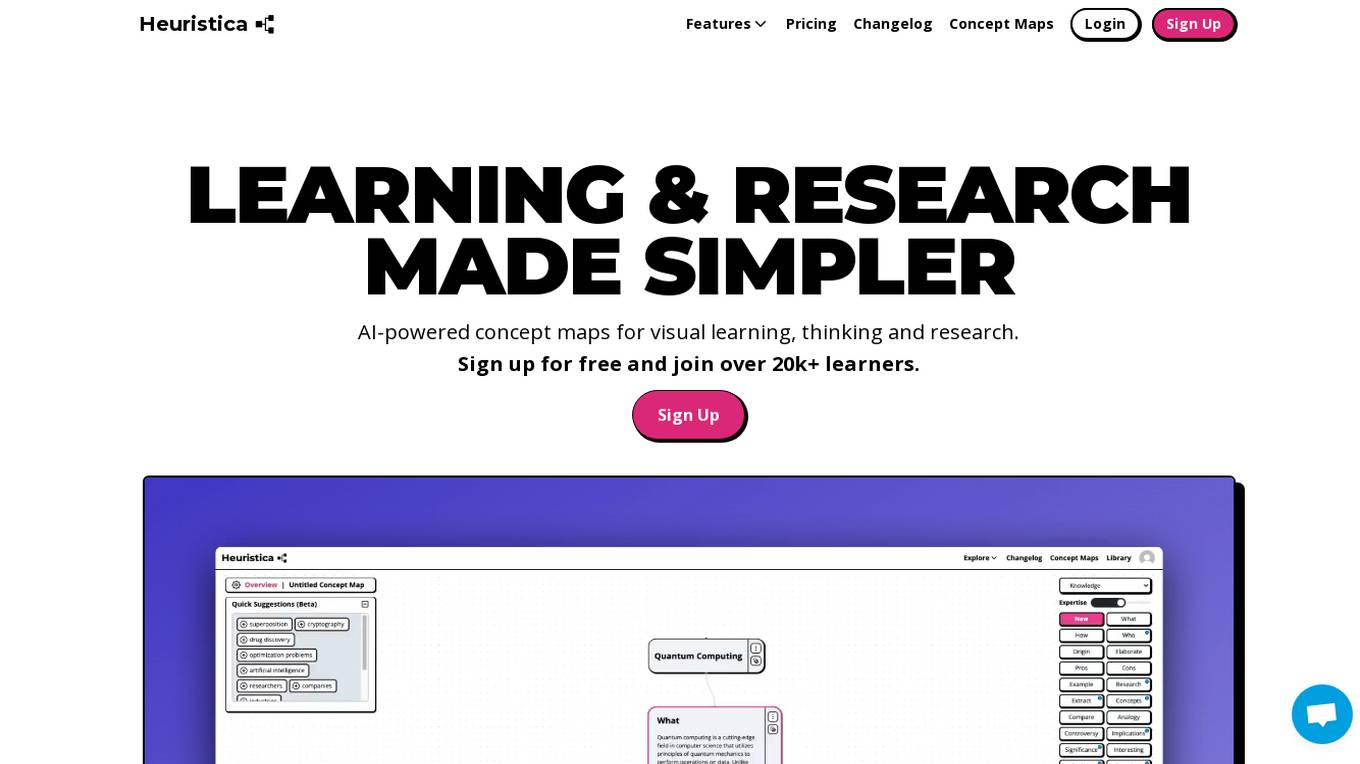
Heuristica
Heuristica is an AI-powered concept mapping tool that uses a mind map-like UI to dive deep into a subject by simply pressing buttons. Concept maps are a visual learning tool that makes acquiring, visualizing, and organizing knowledge easy. Heuristica is used by thousands of industry professionals, business executives, researchers, and students.
For similar tasks

Meltface Typeface
Meltface Typeface is a book about the future of design in the age of AI agents, spatial computing, and ambient UX. It is written by Casey Fictum, a designer and philosopher who has been thinking about the future of technology for over 20 years. The book is divided into nine chapters, each of which explores a different aspect of the future of design. Chapter 1, "The Dawn of Ambient Intelligence," discusses the rise of AI agents and their potential to change the way we live and work. Chapter 2, "Artificial - This Thing Isn't Human," explores the challenges of designing AI agents that are both useful and ethical. Chapter 3, "Spatial - Around My Reality," discusses the potential of spatial computing to create new and immersive experiences. Chapter 4, "Ambient - There, But Not," explores the concept of ambient UX and how it can be used to create more seamless and intuitive experiences. Chapter 5, "Actioned - Do Things on Our Behalf," discusses the potential of AI agents to automate tasks and help us get things done. Chapter 6, "Philosophy for AI Agent Design," provides a philosophical framework for designing AI agents that are both ethical and effective. Chapter 7, "Frameworks for the Future of Design," provides a set of frameworks for thinking about the future of design. Chapter 8, "Guessing the Future of UX Design," speculates on what the future of UX design might look like. Chapter 9, "Finding Meaning & Purpose in the Future of Design," discusses the challenges and opportunities of designing for a future that is increasingly shaped by AI.
For similar jobs

Meltface Typeface
Meltface Typeface is a book about the future of design in the age of AI agents, spatial computing, and ambient UX. It is written by Casey Fictum, a designer and philosopher who has been thinking about the future of technology for over 20 years. The book is divided into nine chapters, each of which explores a different aspect of the future of design. Chapter 1, "The Dawn of Ambient Intelligence," discusses the rise of AI agents and their potential to change the way we live and work. Chapter 2, "Artificial - This Thing Isn't Human," explores the challenges of designing AI agents that are both useful and ethical. Chapter 3, "Spatial - Around My Reality," discusses the potential of spatial computing to create new and immersive experiences. Chapter 4, "Ambient - There, But Not," explores the concept of ambient UX and how it can be used to create more seamless and intuitive experiences. Chapter 5, "Actioned - Do Things on Our Behalf," discusses the potential of AI agents to automate tasks and help us get things done. Chapter 6, "Philosophy for AI Agent Design," provides a philosophical framework for designing AI agents that are both ethical and effective. Chapter 7, "Frameworks for the Future of Design," provides a set of frameworks for thinking about the future of design. Chapter 8, "Guessing the Future of UX Design," speculates on what the future of UX design might look like. Chapter 9, "Finding Meaning & Purpose in the Future of Design," discusses the challenges and opportunities of designing for a future that is increasingly shaped by AI.
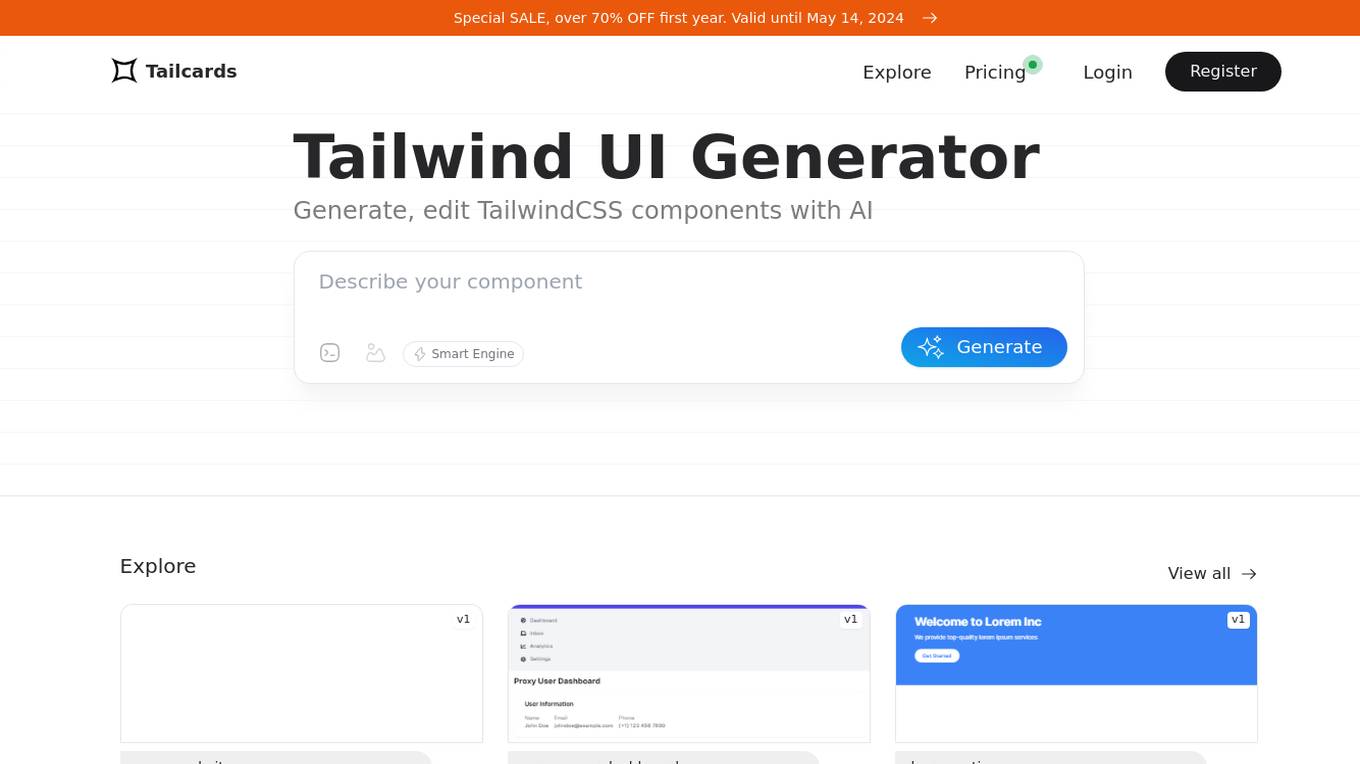
Tailcards
Tailcards is an AI-powered tool that offers a Tailwind UI Generator to help users generate and edit TailwindCSS components with an AI Smart Engine. Users can explore pricing options, subscribe for product updates, and access FAQs, changelog, terms of use, and privacy policy. The tool aims to streamline the process of designing and customizing UI components for web development projects, providing a user-friendly interface and efficient workflow.
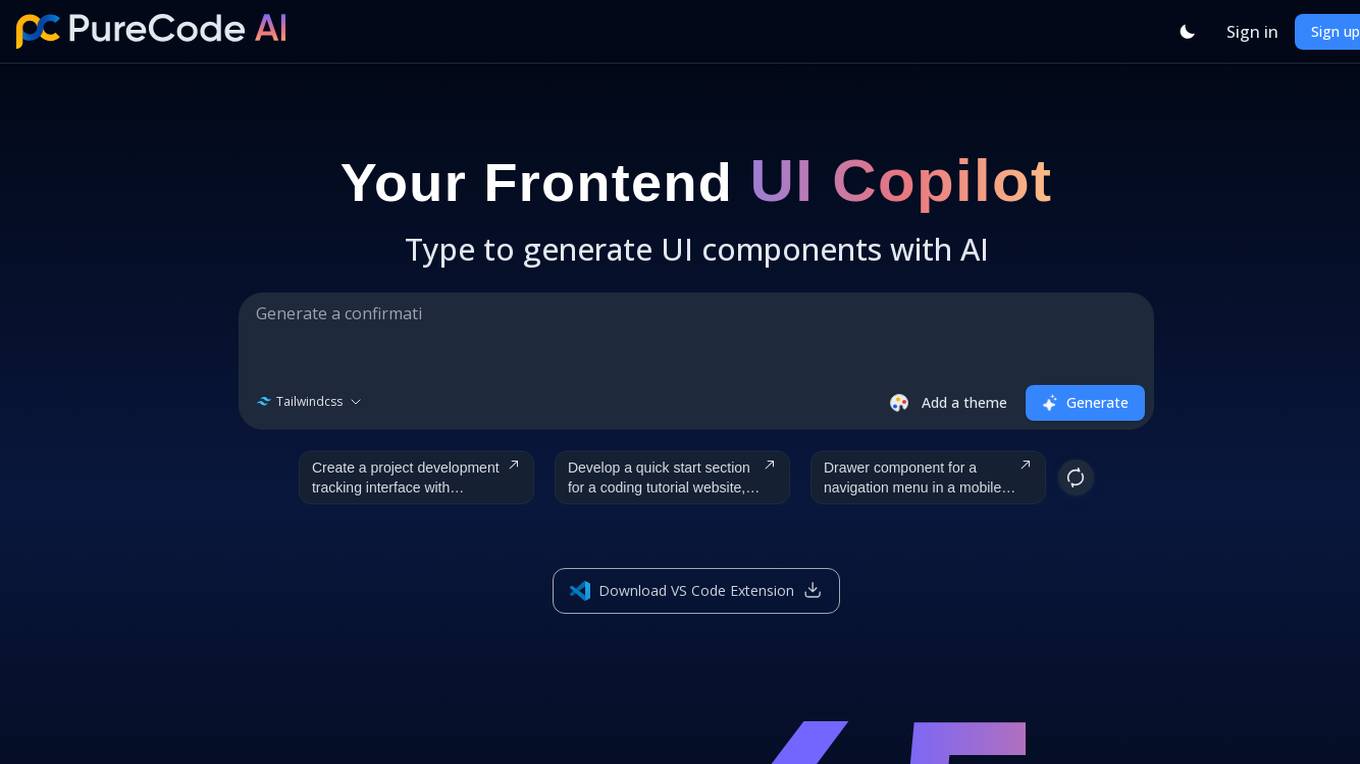
PureCode AI
PureCode AI is an innovative tool that leverages generative AI to assist developers in quickly generating UI components and code snippets for various web development projects. With a focus on streamlining front-end development workflows, PureCode AI offers features such as generating components from text descriptions, creating themes, updating generations efficiently, and providing a VS Code extension for seamless integration. The tool aims to save developers time and effort by automating the process of creating production-ready components across different frameworks like Tailwind CSS, MaterialUI, and plain CSS.

Umbra
Umbra is an AI application that focuses on AI entertainment, AI art, AI stories, and AI shows. It provides a platform for exploring the latest advancements in AI entertainment, including AI-generated music, AI art, and AI stories. Users can also find resources related to game development, gaming news, and top games. The application offers a variety of guides, tips, and tutorials for game development, Unreal Engine, game UIs, audio design, level design, 3D modeling, and game mechanics optimization.
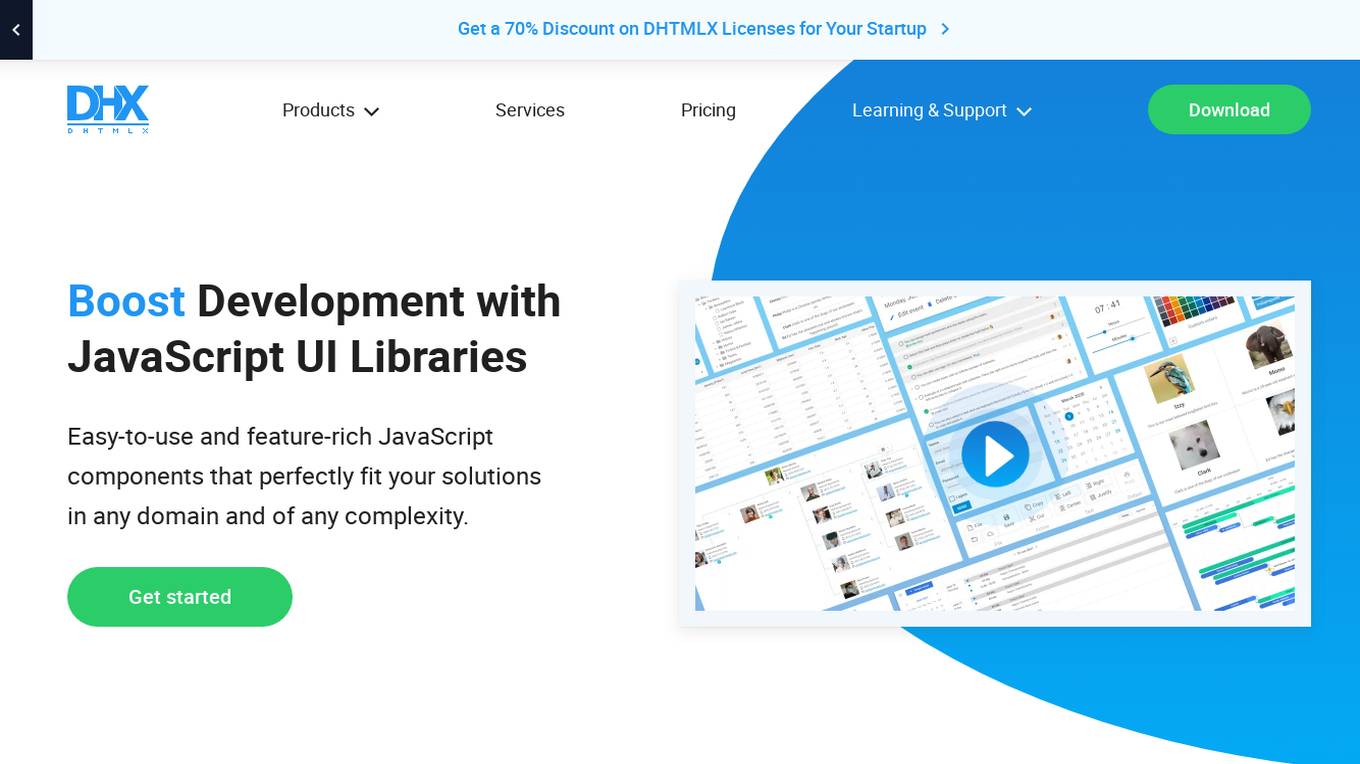
DHTMLX JS Library
DHTMLX is a JavaScript/HTML5 UI framework that offers a wide range of user-friendly AI chatbot and other UI components. It provides feature-rich libraries for project management, data analysis, content management, and more. DHTMLX is known for its easy customization, simple API, and extensive documentation, making it a popular choice for web developers worldwide.
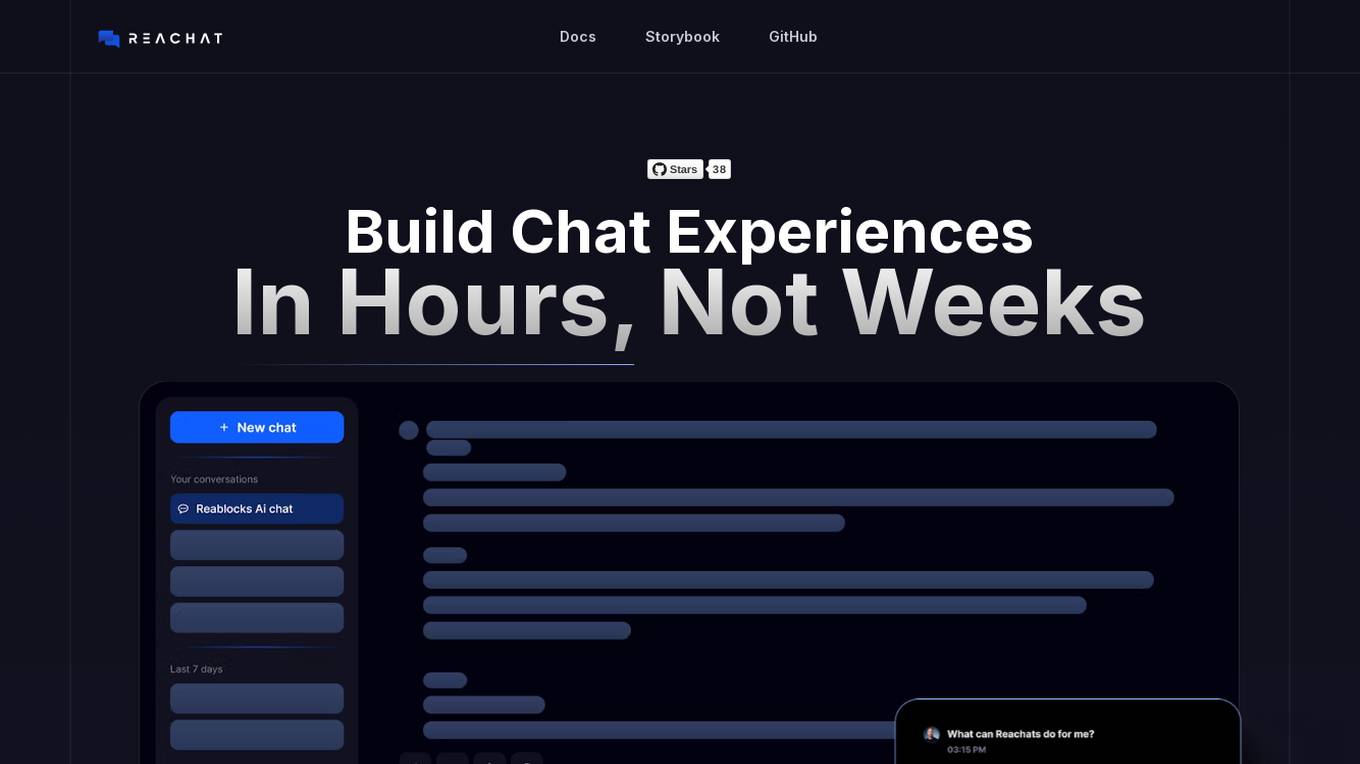
Reachat
Reachat is an open-source UI building library for creating chat interfaces in ReactJS. It offers highly customizable components and theming options, rich media support for file uploads and markdown formatting, an intuitive API for building custom chat experiences, and the ability to seamlessly switch between different AI models. Reachat is battle-tested and used in production across various enterprise products. It is a powerful, flexible, and user-friendly AI chat interface library that allows developers to easily integrate conversational AI capabilities into their applications without the need to spend weeks building custom components. Reachat is not tied to any specific backend or LLM, providing the freedom to use it with any backend or LLM of choice.
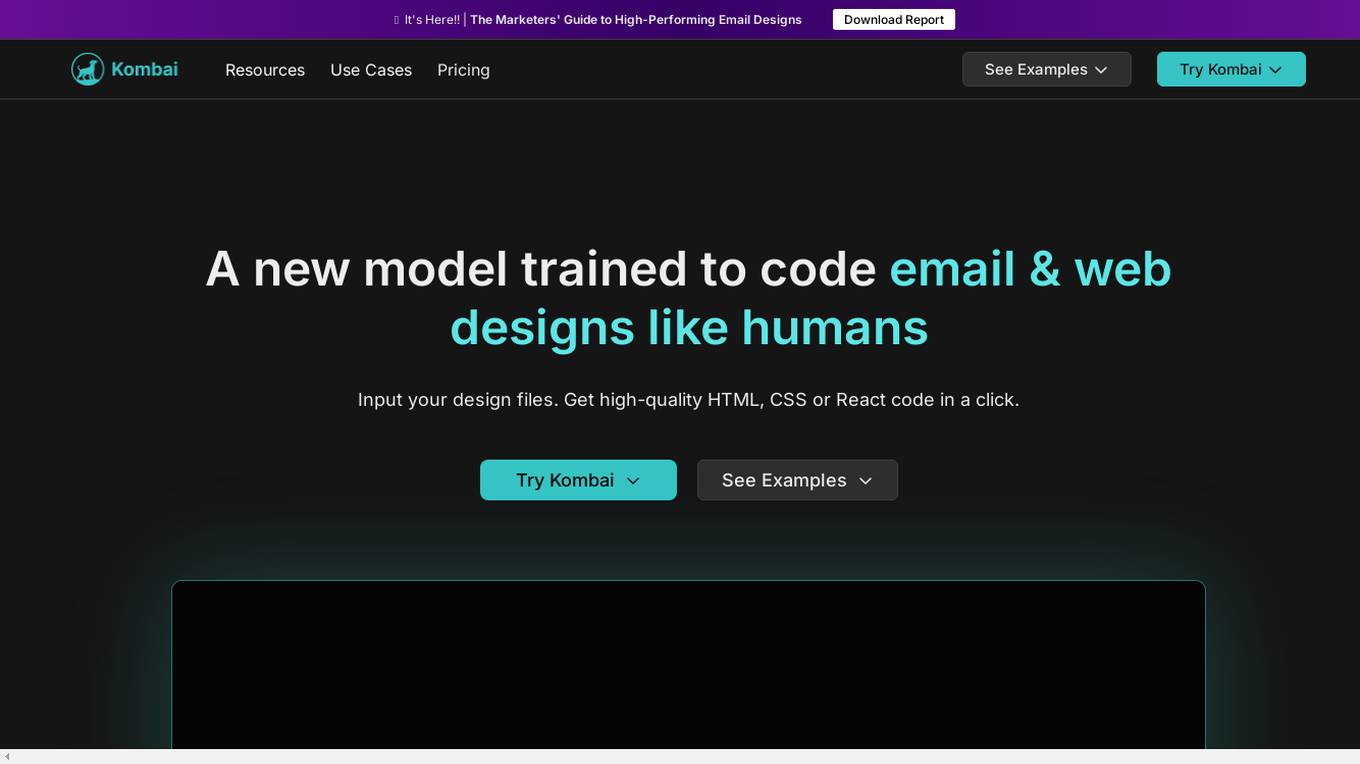
Kombai
Kombai is an AI tool designed to code email and web designs like humans. It uses deep learning and heuristics models to interpret UI designs and generate high-quality HTML, CSS, or React code with human-like names for classes and components. Kombai aims to help developers save time by automating the process of writing UI code based on design files without the need for tagging, naming, or grouping elements. The tool is currently in 'public research preview' and is free for individual developers to use.
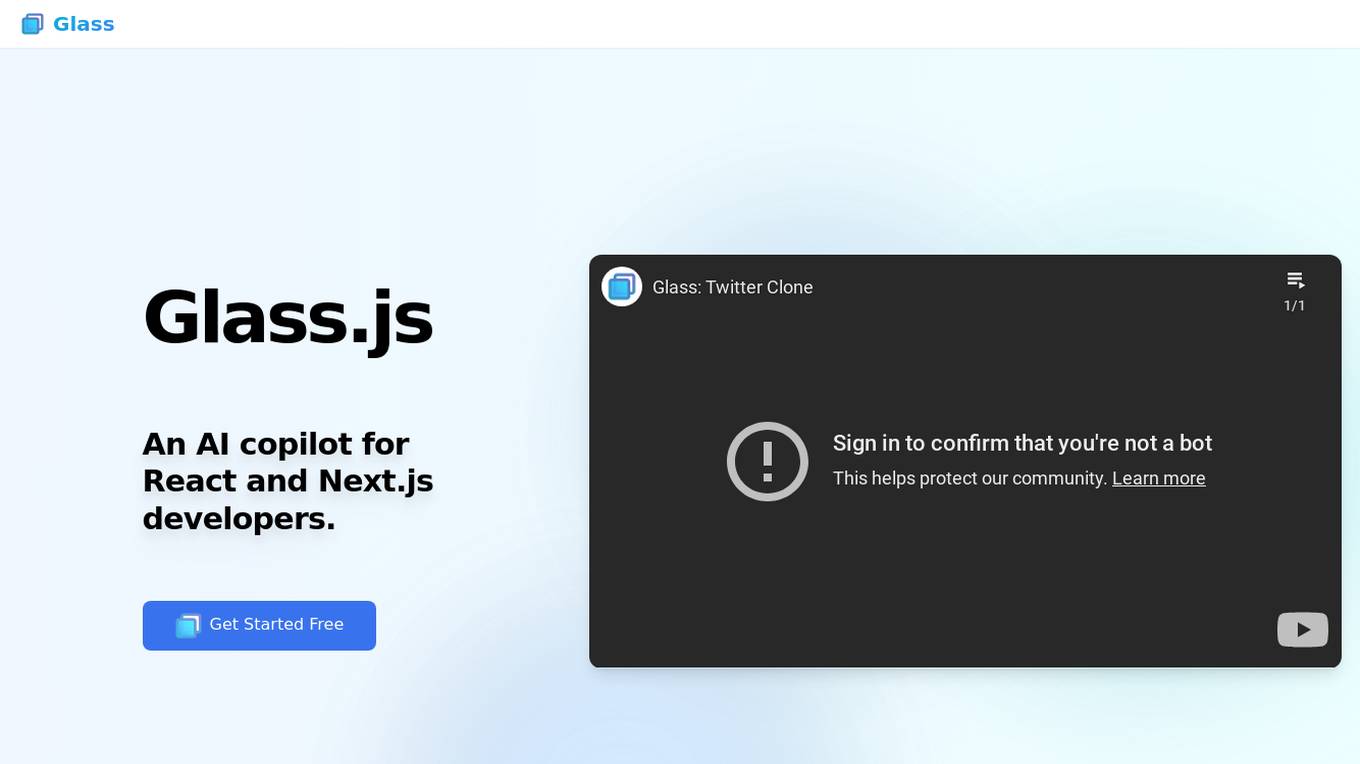
Glass
Glass is an AI copilot designed for React and Next.js developers. It allows users to edit code straight from the browser using AI technology. Glass's AI capabilities include creating components, modifying props, and generating Tailwind CSS. The tool helps developers visualize component structures and easily navigate to source code. Glass is precise and efficient, making React coding faster and more streamlined. It is currently in open beta for startups, with ongoing improvements to its AI functionality.
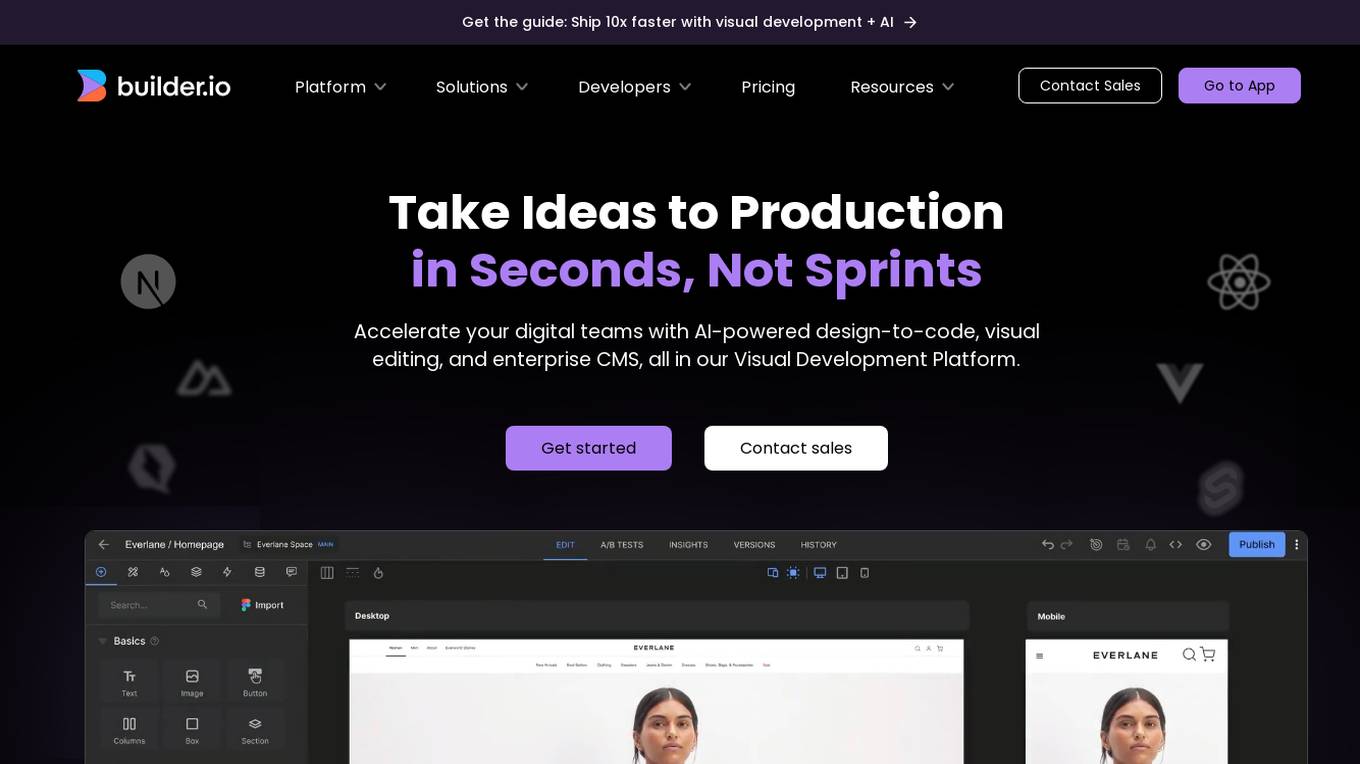
Builder.io
Builder.io is an AI-powered visual development platform that accelerates digital teams by providing design-to-code solutions. With Visual Copilot, users can transform Figma designs into production-ready code quickly and efficiently. The platform offers features like AI-powered design-to-code conversion, visual editing, and enterprise CMS integration. Builder.io enables users to streamline their development process and bring ideas to production in seconds.
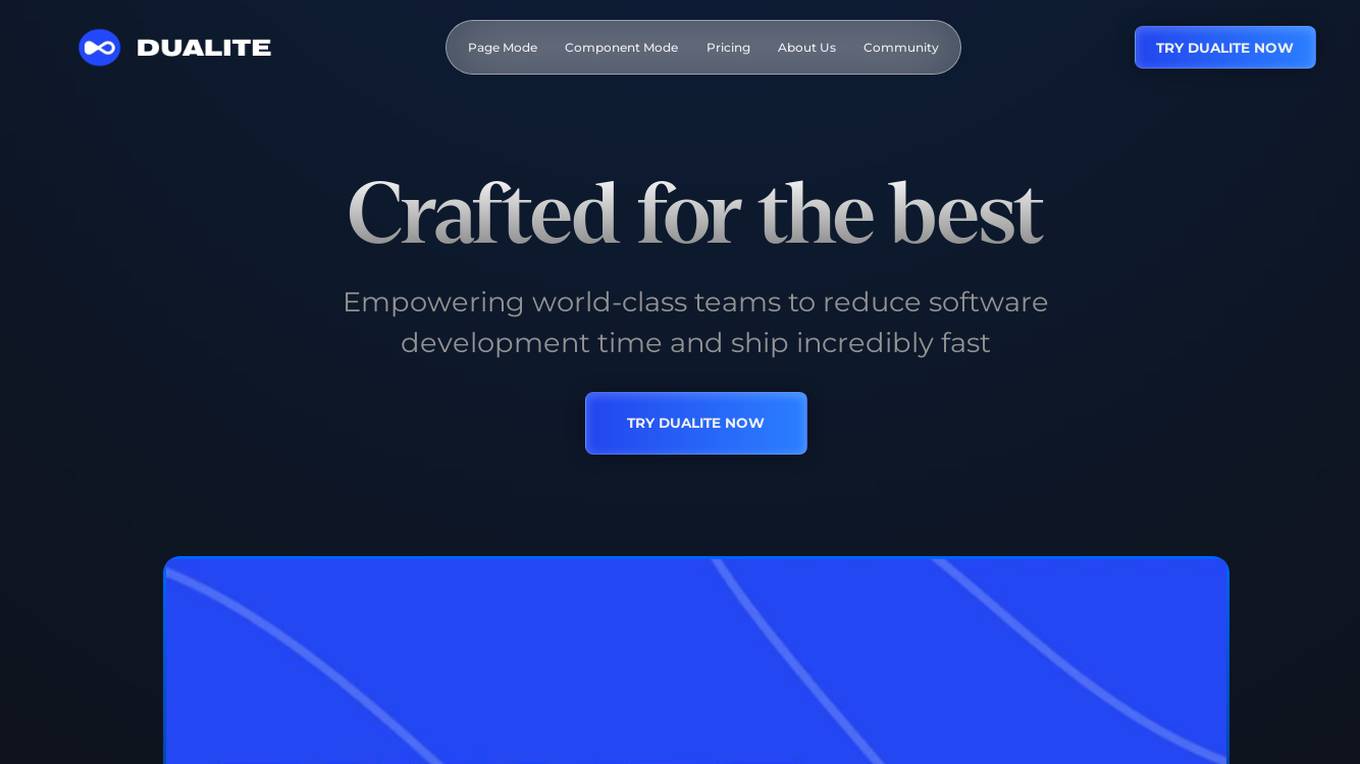
Dualite
Dualite is an AI-powered tool designed to automate frontend development by converting UI designs and prototypes into high-quality and reusable code. It aims to expedite product development speed significantly by streamlining the workflow and bridging the gap between designers and developers. Dualite offers two modes - Page Mode for designers and Component Mode for developers, with features such as fast conversion of complex designs to code, generating high-quality reusable code components, and understanding design semantics using AI. The tool is trusted by over 12K users and has received positive feedback for its accuracy, simplicity, and time-saving capabilities.
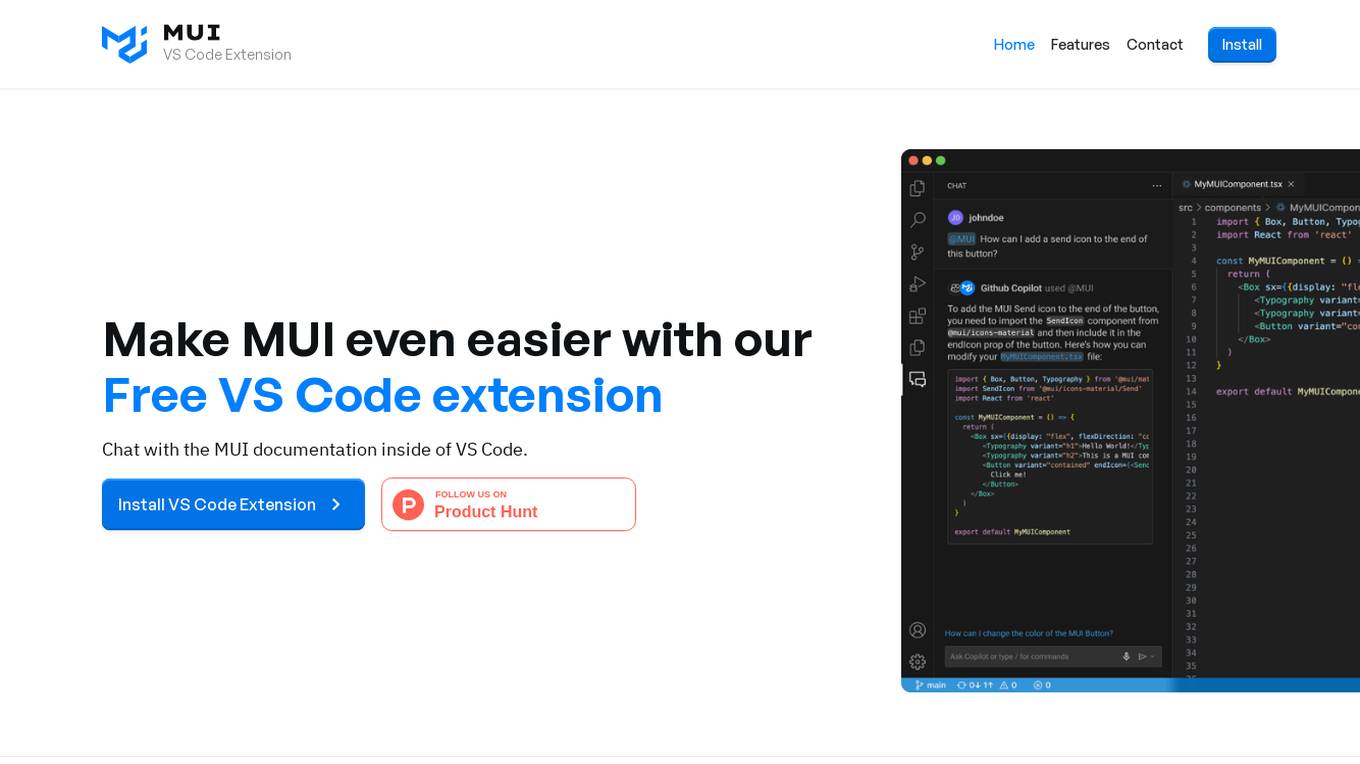
MUI VS Code Extension
The website offers a free VS Code extension that enhances the user experience with MUI (Material-UI) by providing in-IDE documentation, copilot assistance, and direct feedback features. Users can chat with the MUI documentation, get AI-driven responses, search and navigate documentation within the code editor, and provide feedback seamlessly. The extension aims to streamline the development process for MUI enthusiasts and improve overall productivity.

Tailwind Gennie
Tailwind Gennie is an AI-powered tool designed to assist web developers and designers in generating user interfaces using the popular Tailwind CSS framework. By leveraging artificial intelligence, Tailwind Gennie streamlines the UI design process by automatically creating responsive and customizable components based on user preferences and design inputs. With its intuitive interface and powerful algorithms, Tailwind Gennie empowers users to create visually appealing and functional UI designs in a fraction of the time it would take manually.
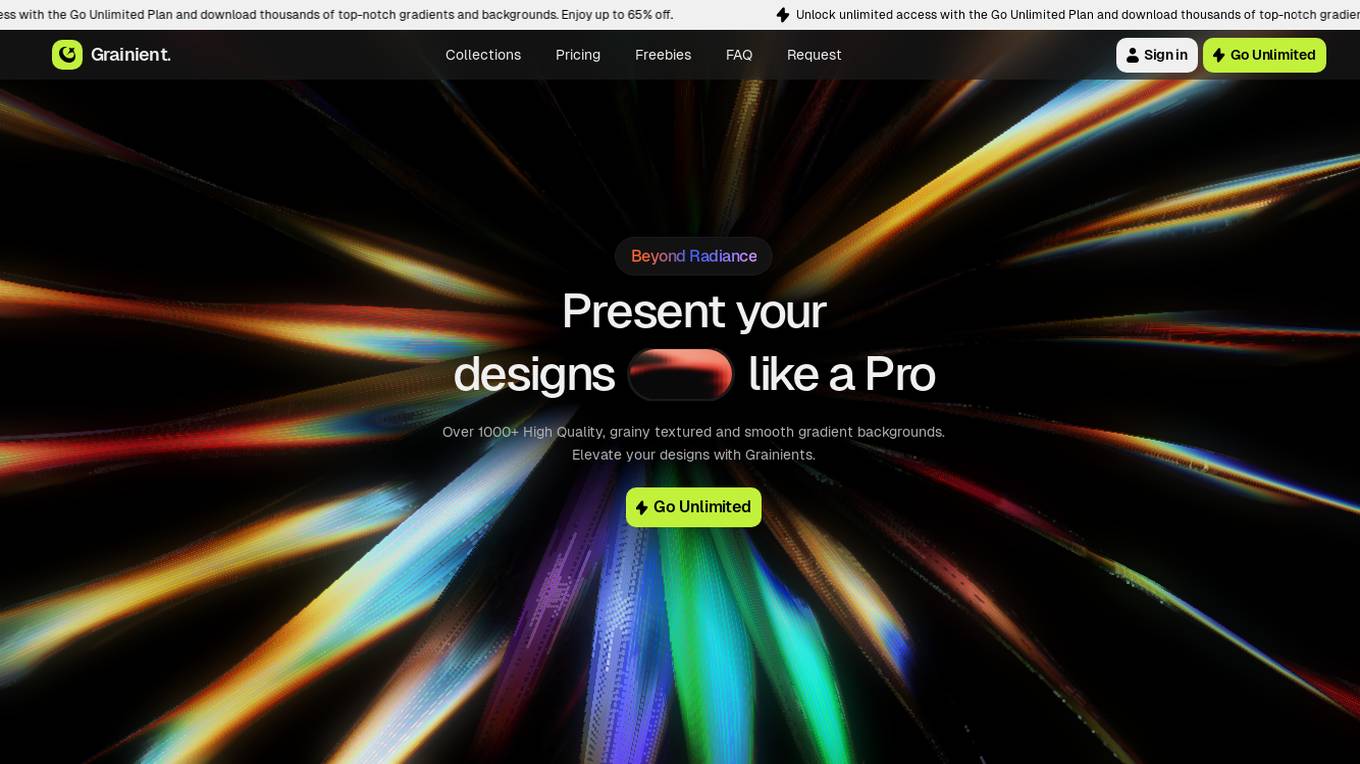
Grainient
Grainient is an AI-powered platform that offers over 1000 high-quality gradients and AI-generated backgrounds for designers and startup creatives. With the Go Unlimited Plan, users can unlock unlimited access to top-notch gradients and backgrounds, enjoying up to 65% off. The platform provides a versatile collection of premium gradients that enhance design presentations, with options ranging from smooth blends to noisy/grainy textures. Users can find a variety of categories such as Spectral Gradients, Darkmists, Mistmusks, Fractal Nights, and Serenmists, each offering unique styles and color schemes. Grainient is loved by creatives worldwide for its customizable gradients and AI designs, making it a go-to resource for UI projects and visual brand identity creation.
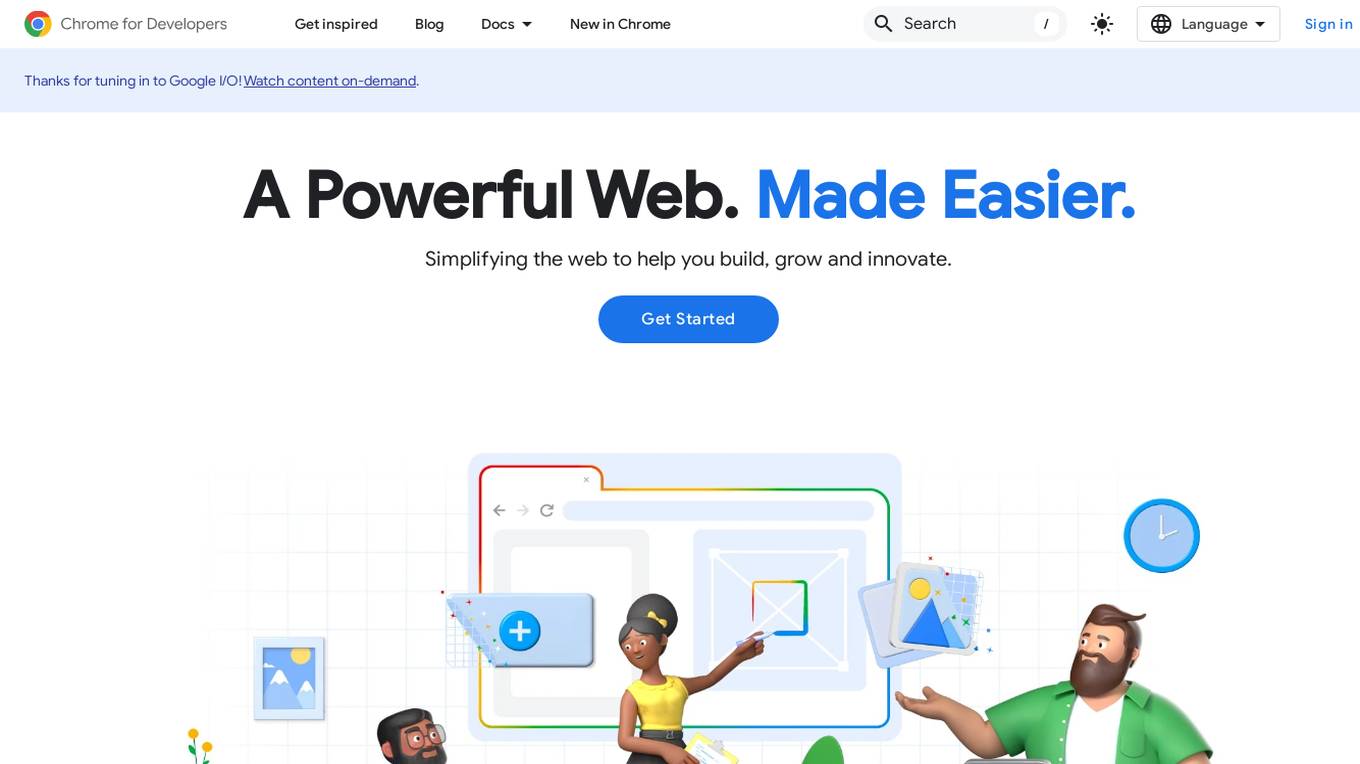
Chrome for Developers
Chrome for Developers is a powerful web development platform that offers a wide range of tools and resources to help developers build, grow, and innovate on the web. It provides features such as DevTools, Lighthouse, Chrome UX Report, and Accessibility tools to create the best user experience. With ready-made libraries like Workbox and Puppeteer, developers can get things done quicker and neater. The platform also focuses on AI performance, CSS and UI design, identity management, payments, and privacy and security. Chrome for Developers is a one-stop solution for web development needs, offering documentation, tutorials, and resources to help developers succeed.
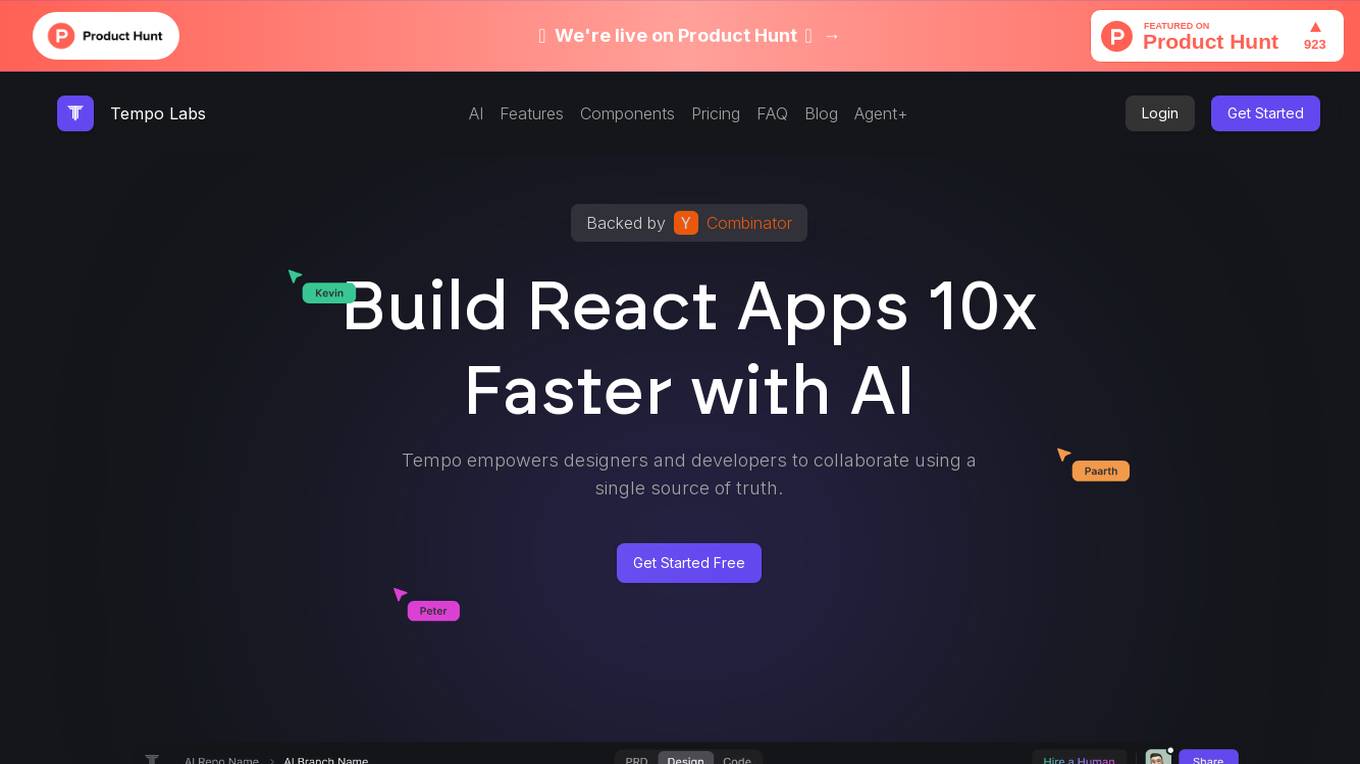
Tempo Labs
Tempo Labs is an AI-powered platform that enables designers and developers to collaborate efficiently by providing a single source of truth. With features like generating functional React apps, designing effortlessly with a drag-and-drop editor, and building and maintaining design systems, Tempo Labs empowers users to work 10x faster. The platform supports any React codebase, allows code editing locally in VSCode, and offers a variety of components and templates for quick start. Tempo Labs offers different pricing plans, including a free tier and a premium Agent+ plan with human engineers and designers for quality assurance.
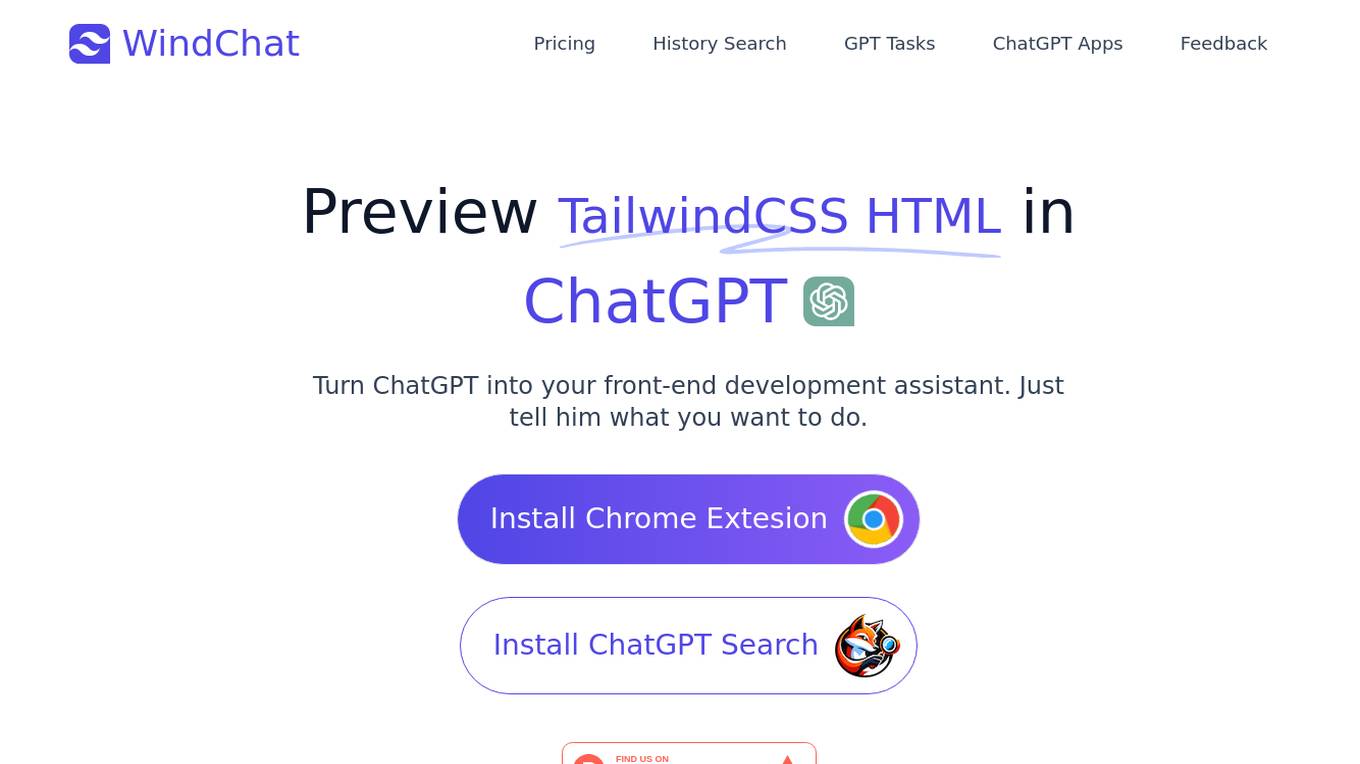
WindChat
WindChat is an AI tool that allows users to preview TailwindCSS HTML in ChatGPT. It serves as a front-end development assistant, helping users design pages or components with beautiful styles. Users can interact with ChatGPT to generate HTML code based on provided component details, images, or icons. WindChat offers a variety of features to streamline front-end development tasks and enhance UI design.
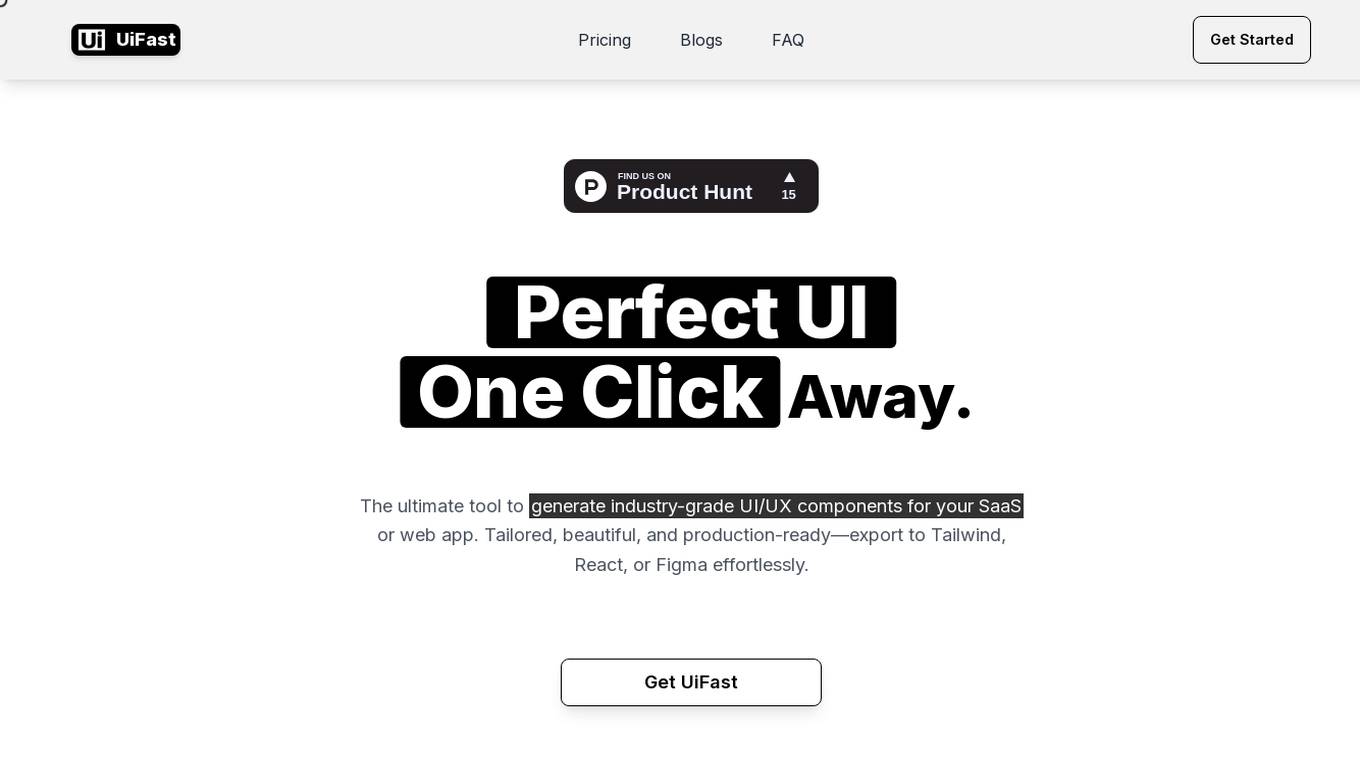
UiFast
UiFast is an AI-powered tool designed to help users generate industry-grade UI/UX components for SaaS or web applications effortlessly. It offers tailored and beautiful components that are production-ready, allowing users to export to Tailwind, React, or Figma seamlessly. With features like Component Generator, Responsive by Default, Customizable Themes, and Export Ready Code, UiFast aims to streamline the UI design process and save time for developers. The tool also provides different pricing plans to cater to users' needs, from basic features in UiFast Lite to advanced prompt models in UiFast Turbo and exclusive beta features in UiFast Beta.
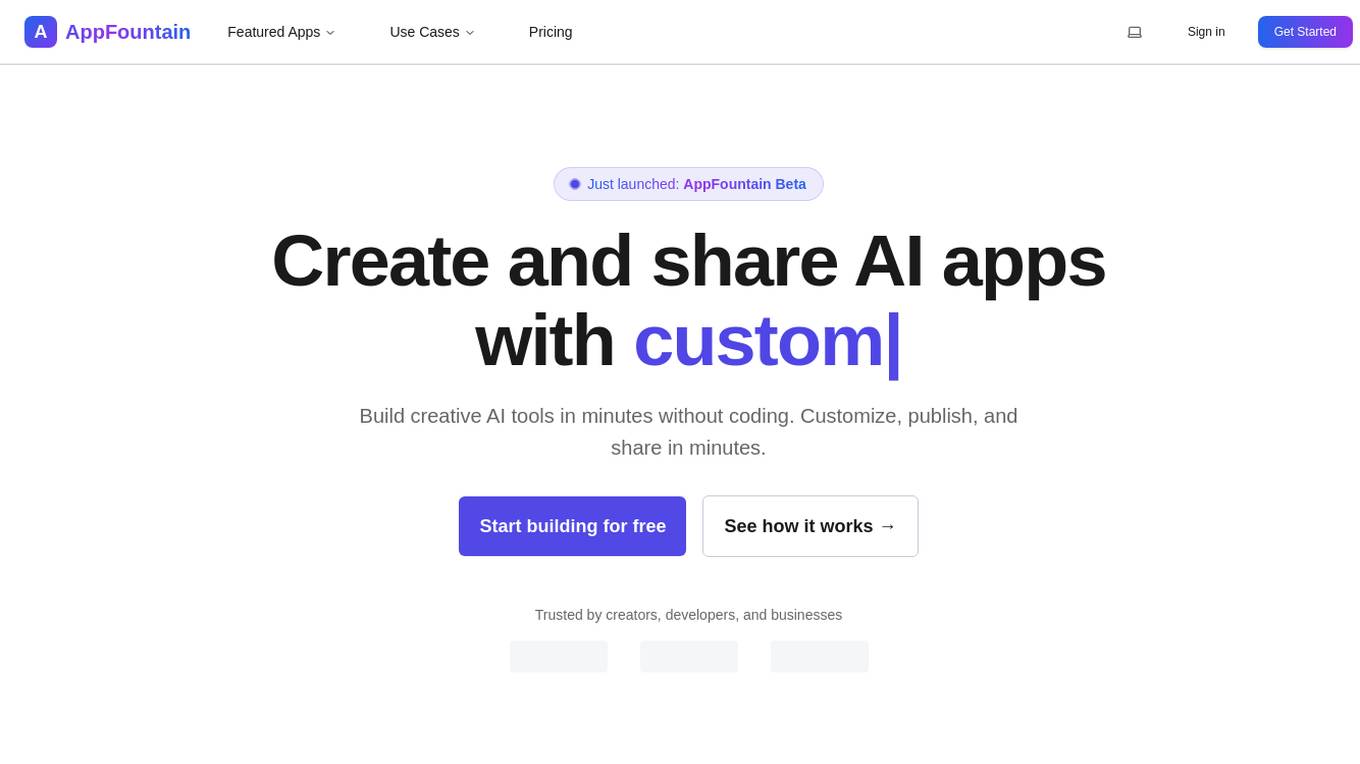
AppFountain
AppFountain is an AI application that allows users to easily build and share AI apps in minutes without the need for coding. With a user-friendly interface, creators can design UI, add AI workflows, and share their apps with friends. The platform offers a no-code builder, AI-powered workflows, and the ability to prototype ideas quickly. AppFountain is trusted by creators, developers, and businesses to create innovative AI tools effortlessly.
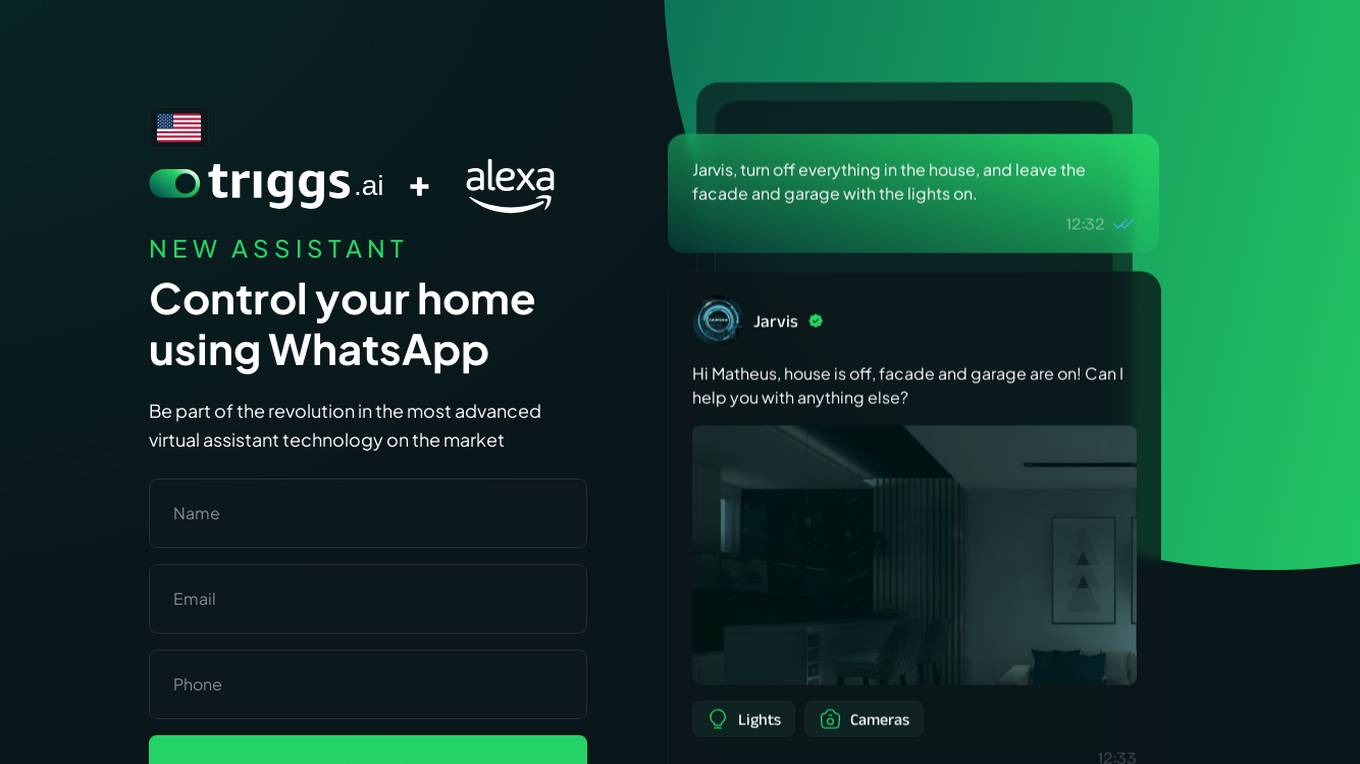
Triggs AI
Triggs AI is an advanced AI tool designed to provide users with a seamless experience in customizing scrollbars. With its intuitive interface and powerful algorithms, Triggs AI allows users to personalize scrollbar designs effortlessly. Whether you are a web developer, designer, or enthusiast, Triggs AI offers a range of customization options to enhance the visual appeal of your websites. Say goodbye to standard scrollbars and hello to a new level of creativity with Triggs AI.
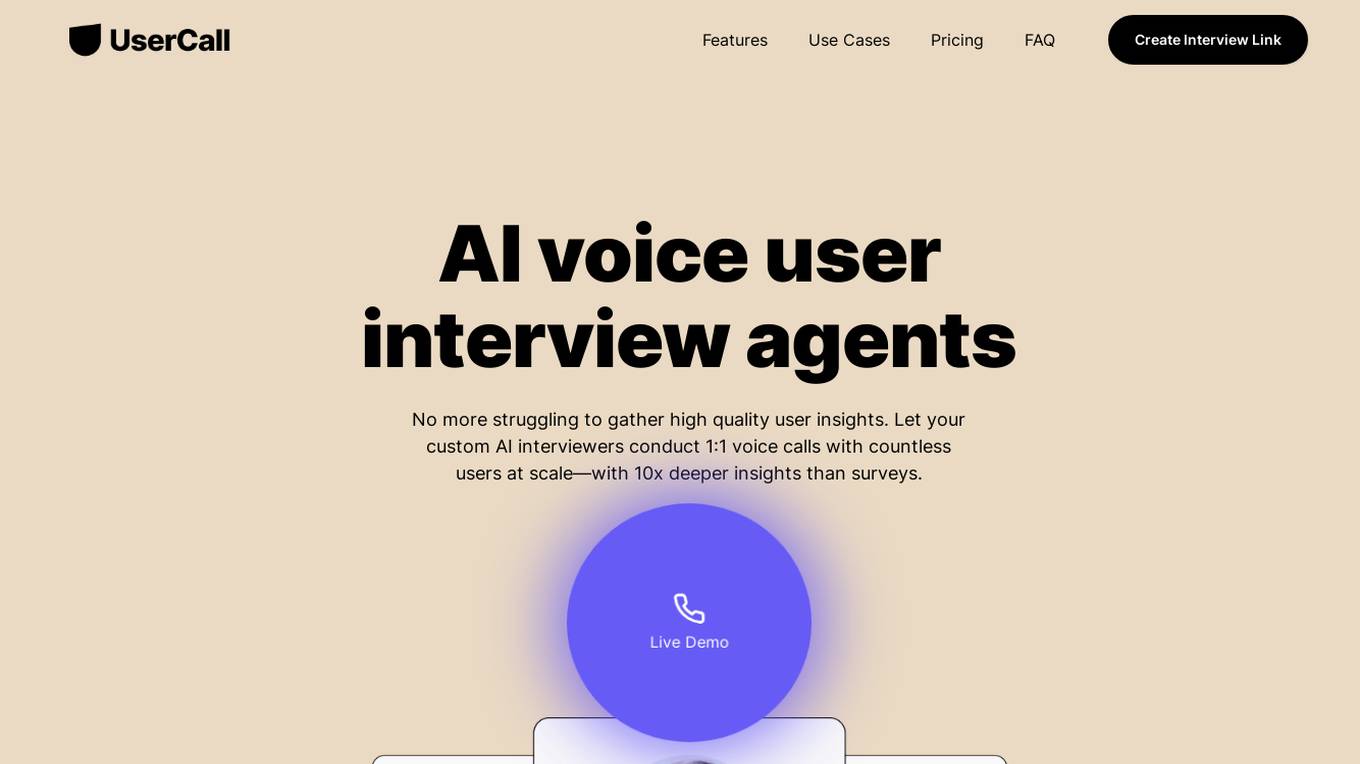
UserCall
UserCall is an AI-powered platform that enables users to conduct high-quality user interviews using custom AI interviewers. The platform offers deep insights through 1:1 voice calls with users, providing smart follow-up questions to uncover customer needs. UserCall saves time and effort by extracting key actionable insights from conversations, offering branded interview links, and facilitating continuous feedback, market research, participant screening, usability testing, and customer satisfaction analysis.
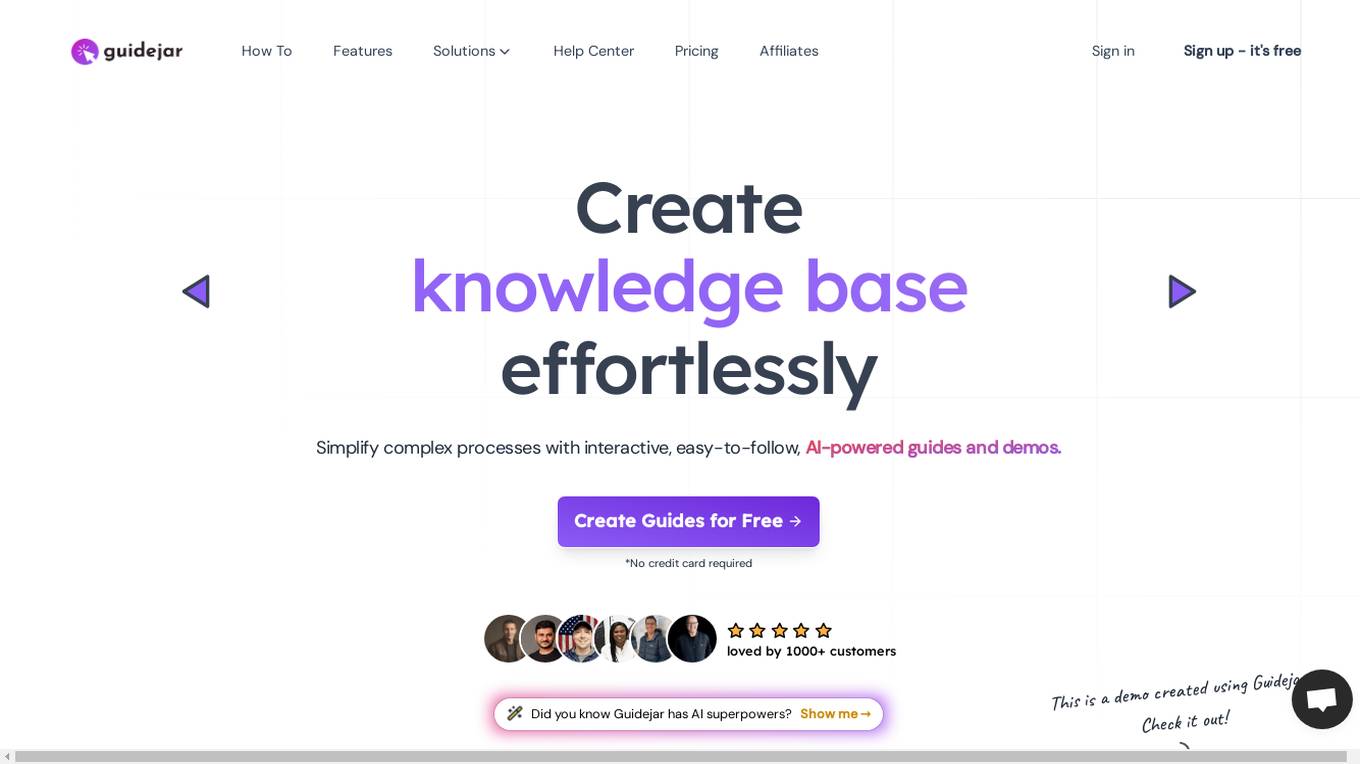
Guidejar
Guidejar is an AI-powered tool that allows users to create interactive product demos and step-by-step guides effortlessly. It simplifies complex processes by providing easy-to-follow guides with AI superpowers. Trusted by teams worldwide, Guidejar helps transform any process into an interactive demo or guide. Users can customize their guides, share them easily, and enhance them with AI magic, voiceovers, and translations. With features like browser extension, branding, step management, guide views, and call-to-action, Guidejar boosts user activation and conversion rates. It offers different pricing plans to cater to various user needs, from free basic features to premium plans with extensive customization and analytics.
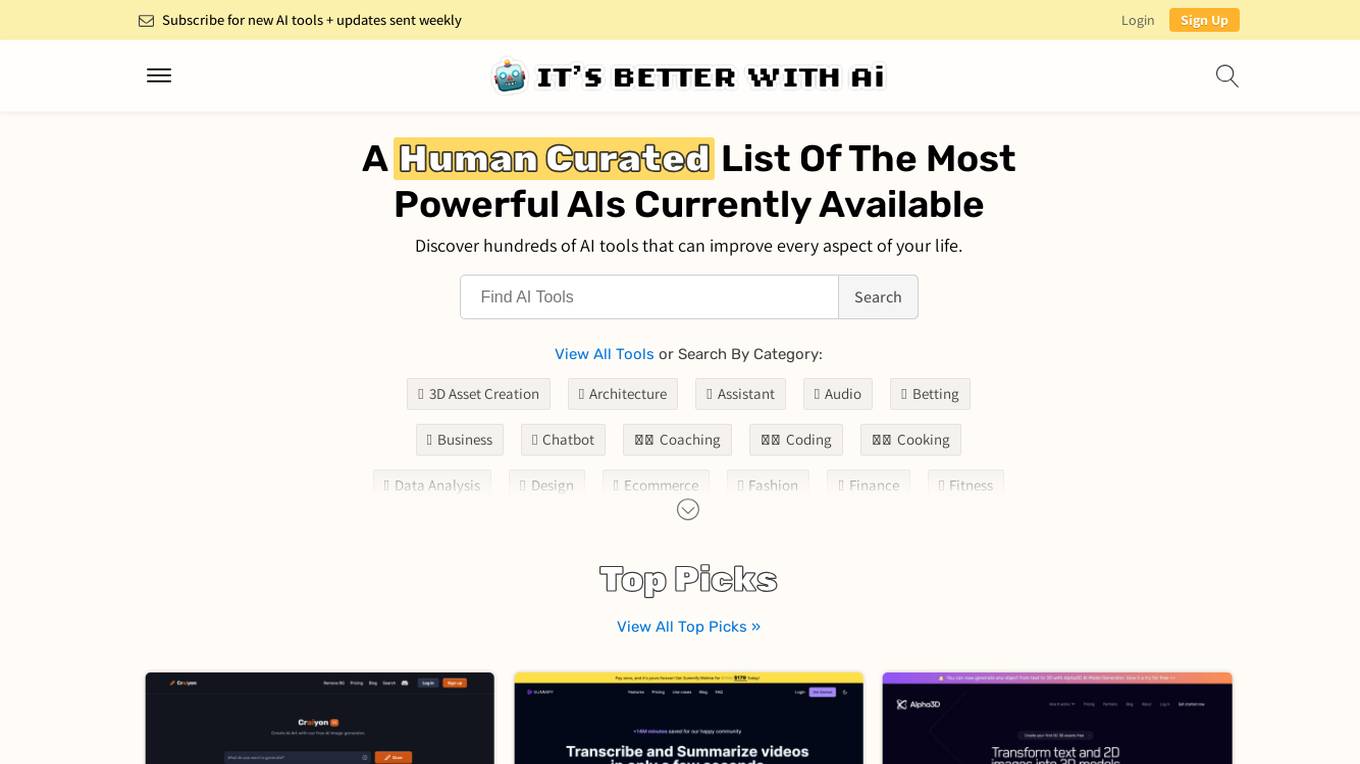
AI Tools Hub
The website is a curated platform showcasing a variety of AI-powered tools designed to enhance different aspects of life. Users can discover and access hundreds of AI tools across various categories such as business, health, music, design, and more. The platform offers a diverse range of applications that leverage artificial intelligence to simplify tasks, improve productivity, and foster creativity.

Great Learning
Great Learning is an online platform offering a wide range of courses, PG certificates, and degree programs in various domains such as AI & Machine Learning, Data Science, Business Analytics, Cloud Computing, Cyber Security, Software Development, Digital Marketing, Design, MBA, and Masters. The platform provides opportunities to learn from top universities, offers career support, success stories, and enterprise solutions. With a focus on AI and Machine Learning, Great Learning aims to elevate expertise and provide transformative programs to help individuals enhance their skills and advance their careers.
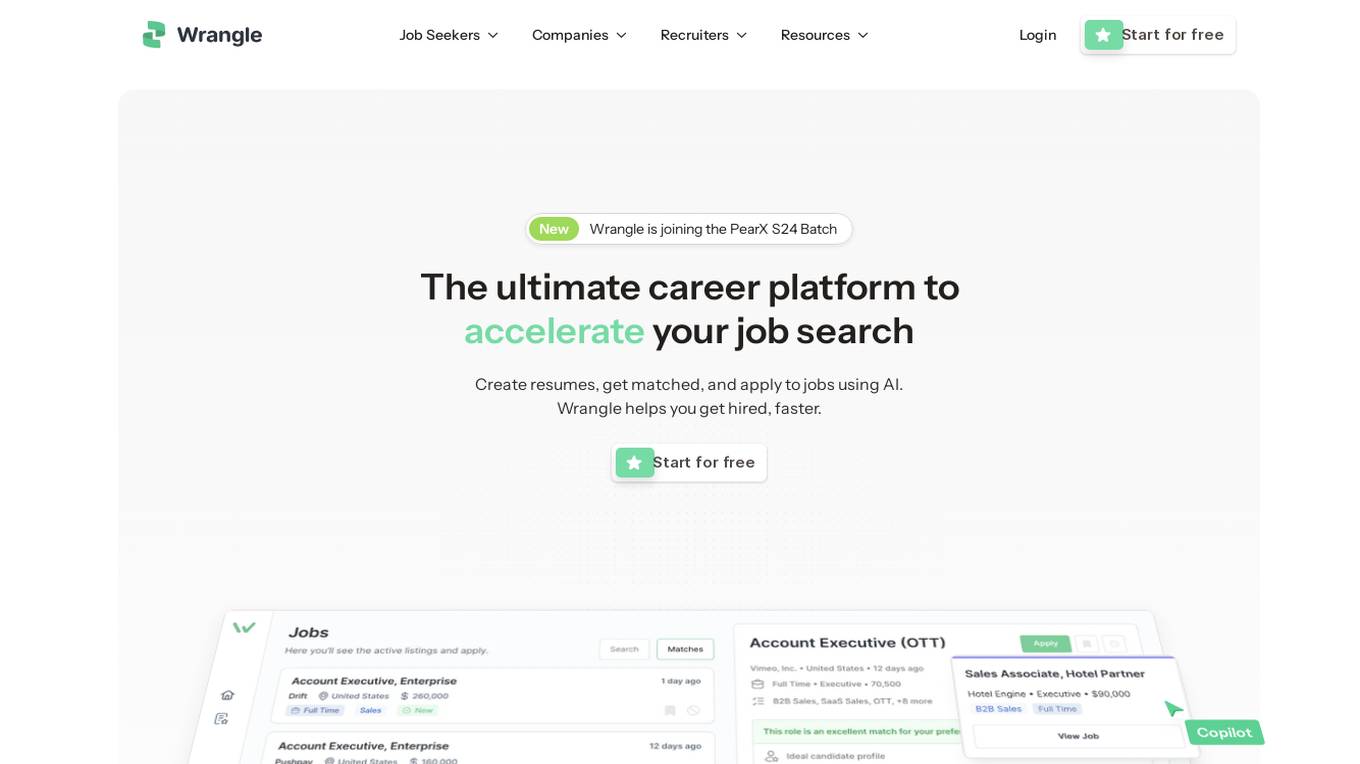
Wrangle
Wrangle is an AI-powered job search and resume builder platform designed to help job seekers find jobs faster and more efficiently. The platform offers personalized AI copilot assistance, extensive job information, resume creation tools, job tracking features, and a learning algorithm to improve job matches. Wrangle provides a user-friendly experience with a focus on data security and no ads or subscriptions.